MISSISSIPPIAN THE Daily
Thursday, September 11, 2025

Thursday, September 11, 2025
During its second official meeting of the 2025-26 year on Tuesday in the Gertrude C. Student Union, the Associated Student Body Senate conducted a second vote on constitutional amendment SR 25-8 — which would change qualifications for vice president candidates — passed four senate bills, consented to a senate proclamation and accepted nominees.
ASB President Jack Jones also announced that he is seeking senate volunteers to join a committee dedicated to taking a deeper look at dining options on campus.
Last week, constitutional amendment SR 25-8 passed with a vote of 36 affirmatives to 13 negatives, requiring one additional senate approval before a final vote by the student body. The amendment passed again Tuesday night with 46 affirmative to two negatives and minimal debate.
The new amendment allows eligibility for vice presidential candidates who have served a minimum of one term in either the legislative branch or the president’s cabinet of the ASB prior to the time of taking office. Previously, candidates must have served
Registered student organizations are uncertain whether they can hold events or produce programming this fall after Provost Noel Wilkin announced last month that the University of Mississippi is closing access requests for the Student Activity Fee. As part of their tuition, UM students pay $2 per credit hour to fund the SAF.
The university indicates that a new plan for RSO funding will be announced soon.
“The university is working with student leaders to create a plan for student programming that will serve our student body and uphold our commitment to having student events and activities this semester. We expect to be able to share those plans soon,” UM Director of News and Media Relations Jacob Batte said in an email to The Daily Mississippian on Wednesday, Sept. 10.
The university’s decision to freeze SAF funding follows Gov. Tate Reeves’ signing of House Bill 1193, passed by the Mississippi Legislature last spring, which
prohibits Mississippi public K-12 and postsecondary schools from maintaining “any programs, including academic programs or courses, or offices that promote or endorse divisive concepts or concepts promoting transgender ideology, gender-neutral pronouns, heteronormativity, gender theory, sexual privilege or any related formulation of these concepts.” According to a recent Mississippi Attorney General opinion, the bill exempts RSOs but not stu -
al, which bused a jury from Forrest County, Miss., to Oxford.
Lafayette County Circuit Court Judge Kelly Luther has rescheduled the retrial of former University of Mississippi student Sheldon Timothy Herrington Jr.— who is charged with capital murder in the 2022 death of former UM student Jimmie “Jay” Lee — for Dec. 1 in the Lafayette County Courthouse.
A representative from Luther’s office confirmed to The Daily Mississippian that the trial’s date has been moved from a previously scheduled Oct. 13 start with agreement by the state and the defendant parties. Jury members will be selected from a pool of individuals outside Lafayette County, the representative confirmed, with the location to be determined in the “fairly near future.”
This models the approach from Herrington’s previous tri-
Herrington previously stood trial for capital murder in December 2024. The trial was declared a mistrial by way of a hung jury.
In February of this year, Lee’s remains were found in a wooded area in Carroll County, Miss., prompting a new indictment, including charges of capital murder and tampering with evidence. Herrington entered a plea of not guilty.
On March 7, Luther dropped the tampering with evidence charge, as the two-year statute of limitations had expired. In May, Herrington petitioned for a change of venue, claiming that the extensive media attention would make it impossible for him to have a fair trial in Lafayette County.
Luther granted this request in June, noting that the prosecution did not oppose the move. However, Luther’s order dictated that
the trial will take place in Oxford. Herrington remains in Lafayette County Jail ahead of the retrial.


RAEGAN SETTLE Managing Editor
Navigating collegiate life as a student with a physical disability brings a unique set of challenges.
Lifelong Ole Miss fans Braden Neal and Marilee Cleveland would only settle for attending the University of Mississippi, even if it meant living on a campus with less disability resources than other Mississippi public schools.
Students can register with the Office of Student Disability Services (SDS) to obtain disability-related accommodations. The office operates under the Division of Access, Opportunity and Community Engagement and works to remove curricular and programmatic barriers.
“Our focus is on working with each individual student to meet their needs and ensure access to higher education,” Jacob Batte, director of news and media relations at UM, said of the mission of SDS.
At the time of publication, 2,146 students were registered with SDS for the fall 2025 semester. This is not the total number of students with disabilities at UM, as registration with SDS is not required.
UM abides by all state and federal disability laws, including the Americans with Disabilities Act (ADA). The ADA is a federal law that prohibits discrimination against people with disabilities. Title II of the ADA protects students with disabilities at state and federally-funded colleges.
To abide by the ADA, the university must ensure that facilities are accessible to students with disabilities; provide services necessary to ensure such students receive effective communication, support and access; make reasonable academic and policy adjustments to ensure students with disabilities have equal opportunities; offer a level playing field by ensuring fair treatment in admissions, programs and services.
The university’s adherence to the ADA, however, does not necessarily create equal experiences across the board for students with physical disabilities.
Senior multidisciplinary studies major Braden Neal suffers from spastic quadriplegia cerebral palsy, a birth injury to the brain resulting in limited mobility and trunk control, in his case. The Middleton, Miss., native currently resides in a wheelchair-accessible room in Pittman Hall. The university assigned him a room in Campus Walk Apartments his sophomore year, resulting in 10 months of transportation difficulties.
“I learned very quickly there were some massive issues, one of them being the amount of battery it took for me to get up that massive hill in the middle of the woods … once it got cold, that presented even more problems,” Neal said.
When Neal resided at Campus Walk Apartments, the nearest stop for OUT buses operating on Sundays was inaccessible to him. Campus Walk Apartments has since been added to the Brown/ Hathorn Sunday route.
With no public transportation available to him on Sundays, Neal drove his wheelchair one hour each way to mass at St. John the Evangelist Catholic Church from his university-owned apartment.
“I had a couple times where (my wheelchair) died only because of the amount of miles I was going,” Neal said. “I had to drive super slow to get there, which took me an hour, because the faster you go, the more battery it takes.”
Neal reported two instances of his wheelchair battery dying on his long commutes and several times of the battery life reaching critically low levels.
“You call friends for help. I mean, that’s all you’ve got. And you hope to God somebody answers,” Neal said.
Securing a room in Pittman Hall, where commutes to class are shorter and flatter than Campus Walk Apartments, took months of long processes and back-and-forth communication between Neal, UMatter, SDS and Student Housing.
UMatter assists students facing challenges by coordinating support efforts both on and off campus, promoting personal and academic success. Students are assigned case managers who intervene on their behalf to advocate for their well-being. UMatter is housed within the Division of Student Affairs.
Mandi Bloodworth is a case manager at UMatter who helped Neal secure changes to his housing situation. Bloodworth facilitates communication between students and adminis-
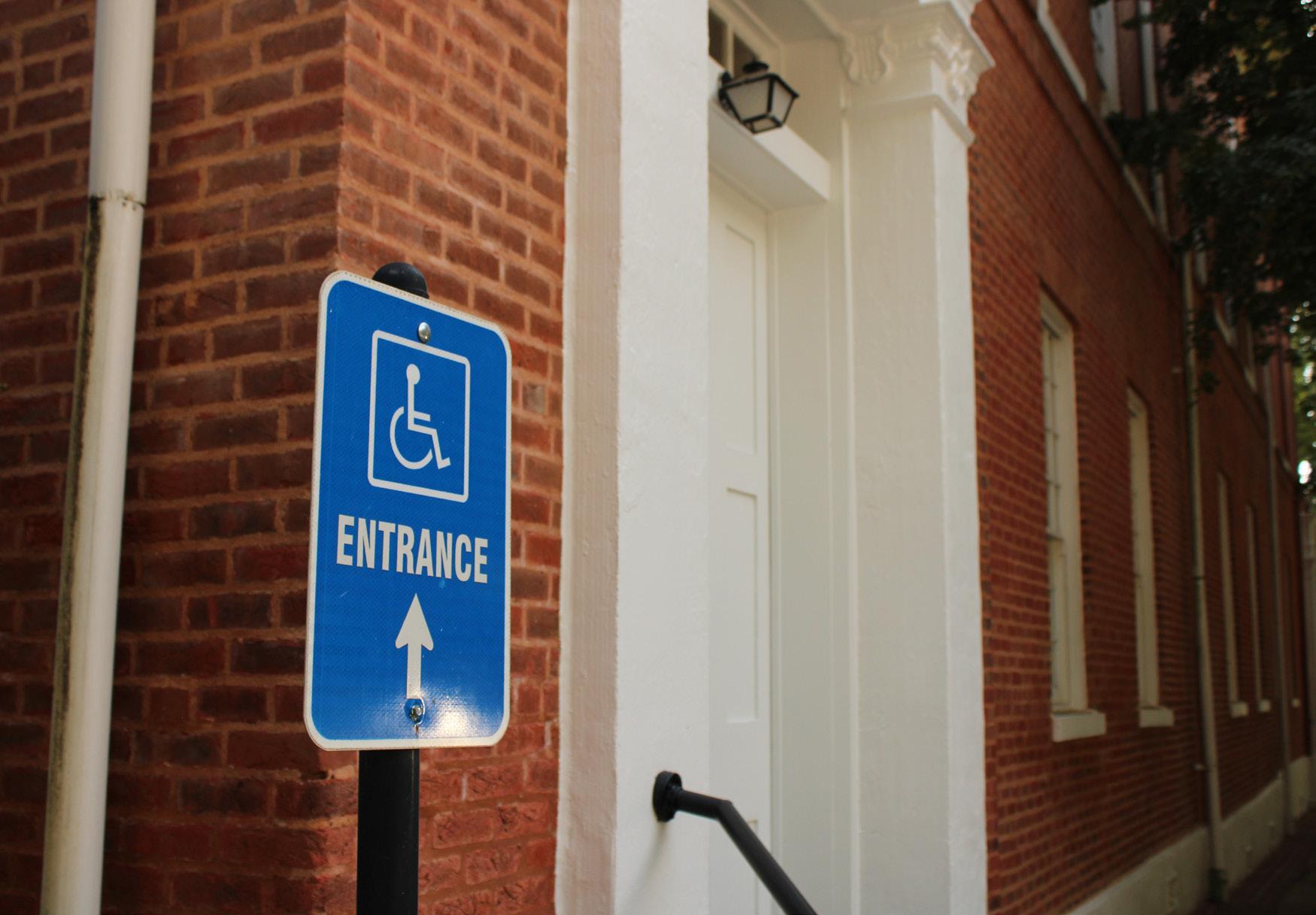
trative programs and offers a listening ear to students unsure whether they should ask for help and to those seeking assistance with their circumstances.
“Sometimes these processes take longer than a student would like, and I think it can be frustrating for students if it seems like there’s a delay,” Bloodworth said. “They may feel like they’ve been overlooked or forgotten about, so I also try to learn where things are in the process and share that with the student so they’re kept informed.”
ASB steps in on accessibility concerns
Senior public policy leadership major Marilee Cleveland served as principal of acces-

sibility for ASB the past two years. Like Neal, she has been diagnosed with cerebral palsy.
“My job is to manage whatever SDS cannot do or where there is miscommunication, which so often comes back to me,” Cleveland said. “So, if you need help like me, like having someone help you to class, you have to find it yourself. My job is to make the fallout on students easier.”
The Jackson native said her relationship with SDS has been “rocky” throughout her time as a student, noting that it has improved slightly over the past year. Cleveland said when it comes to navigating special circumstances pertaining to physical disabilities, SDS has a lack of communication.
“Sometimes the blame gets put in the wrong place,” Cleveland said. “It falls back on a student, and that’s not what the university should do. There’s often this air, or they’ll send you an email back, like ‘We did everything we could,’ ‘This is not what we handle’ or ‘You should have reached out to so and so.’ And it often just stops there.”
She explained that SDS is overworked and understaffed.
Cleveland gives the office grace on some issues for this reason, but she believes improvements to their current circumstances are necessary for improving the college experiences of students with physical disabilities.
The Ole Miss vs. State debate for disabled students
Cleveland said that the difficulties many physically disabled students experience working with SDS at UM contribute to Mississippi State University’s reputation as the top choice in the state for the demographic.
Kasee Stratton-Gadke serves as the executive director of the Mississippi Institute on Disabilities at MSU. The institute houses four centers on the university’s cam-
pus: the T.K Martin Center for Technology and Disability, the ACCESS Program and Specialized College Services, the Career Horizons Center and Autism and Developmental Disabilities Clinic. Almost all services offered across the centers are available to anyone in the state of Mississippi, according to Stratton-Gadke.
“I think the university, particularly, has had a strong disability history that goes back way before my time here at Mississippi State,” Stratton-Gadke said. “Dr. Martin, who the T.K. Martin Center is named after, really kind of pushed for ADA accommodations on campus way before there was a law that required such accommodations … So, I think he really spearheaded a movement that’s just been a solid part of the foundation at State.” Having the Mississippi Institute on Disabilities on campus has built an awareness of services offered on the MSU campus statewide, Stratton-Gadke said. Students with physical disabilities may be more knowledgeable of the help available to them at MSU versus other public universities in Mississippi.
For patients with physical disabilities, the T.K. Martin Center at MSU offers custom-built driving technology and driving lessons, allowing patients to become mobile in a way they may never have had access to before. This program is one example of how MSU uniquely caters to the personal and professional development of students with physical disabilities. Cleveland said she and many other UM students with physical disabilities feel SDS caters heavily to students with developmental and learning disabilities. Batte said the university provides institutional support toward accessibility on our campus, including all
federally required services.
“Funding for Student Disability Services has increased from $1.2 million last year to $1.4 million this year, an 11% increase,” Batte said. “SDS works with each student individually to identify and implement accommodations based on their needs.”
Batte did not address The Daily Mississippian’s question of what percentage of these funds go toward resources specifically for students with physical disabilities.
“The university does not separate students into broad categories such as ‘physical’ or ‘mental’ disabilities because about three-quarters of students registered with SDS have multiple diagnoses, and those diagnoses often span categories,” Batte said.
Personal care assistant troubles
Student leaders are working to establish new programs at UM to expand the number of services available to students with physical disabilities.
Cleveland and the current ASB principal of accessibility
Emerson Morris worked together for the past year to implement a ‘buddy system’ on campus, pairing student volunteers with physically disabled students to help with tasks normally reserved for personal care assistants (PCAs).
“We’re hoping to enlist stu-
dents who are hoping to go into healthcare professions who need those hours doing service,” Morris said. “They’ll get this experience and help physically disabled students who are bound to wheelchairs, or maybe have crutches and need help carrying backpacks. So, we’re hoping that this will provide them with a smoother transition into college and something that’s a little bit more reliable and accessible to them to improve their experience on campus.”
Morris said the biggest obstacle to implementing this system is navigating potential liability issues for student volunteers, as well as getting SDS or another department to approve and manage the program. She said this project will be continued under ASB President Jack Jones’ administration.
Neal has experienced trouble finding and keeping PCAs, exemplifying why a program like the one Morris and Cleveland have outlined would be beneficial at UM. Between navigating payment plans, few individuals offering PCA services, and the extensive administrative process to secure IDs with dorm room access for PCAs, Neal turned to alternative means to ensure he received the care he needed.
During the fall 2024 semester, Neal’s primary PCA resigned, leaving him to depend on friends and family to travel to Oxford and perform
morning and nightly personal care duties. After his former PCA left, Neal did not have a PCA onboarded with completed university paperwork and a background check for multiple weeks.
There were several nights Neal would give his student ID to a friend who transferred him to bed so the friend could reenter his room in the morning, as Neal is not physically able to get out of bed on his own to let someone into his hall.
Neal received five emails, one from SDS and four from Student Housing. Each email alleged that Neal violated the Student Housing visitation and overnight guests and identification cards policies. The emails stated that future violations would result in referral to the Office of Conflict Resolution and Student Conduct for initiation of the student conduct process.
In September 2024, after receiving the first email in this series from SDS director Stacey Reycraft, Neal called and explained his predicament to then-ASB Vice President Jack Jones, who now serves as president.
Jones confirmed that he did receive a call from Neal and that he proceeded to call a university staff member to advocate on Neal’s behalf. Jones declined to identify the staff member but acknowledged that he/she was not employed in the Office of Conflict Reso-
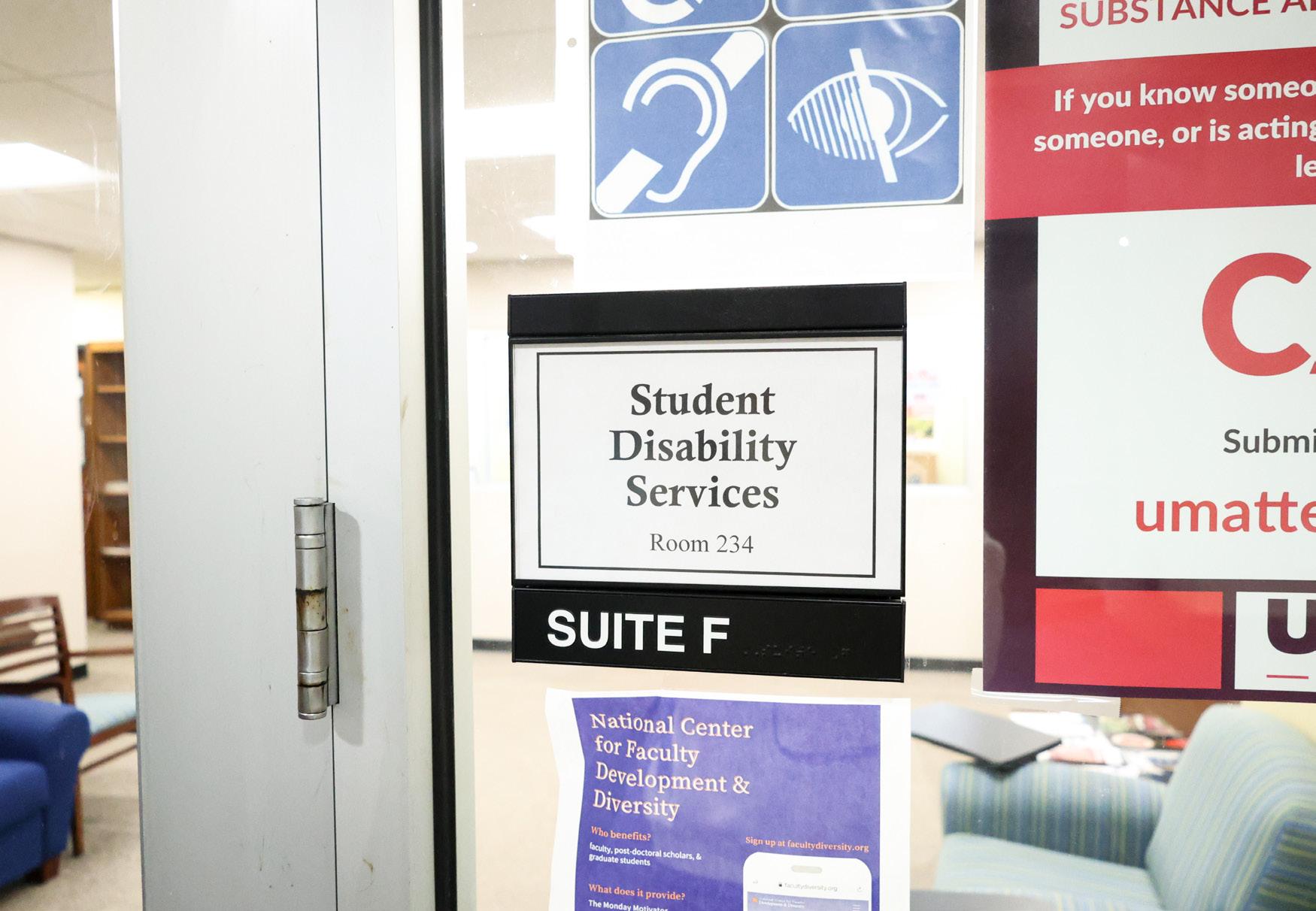
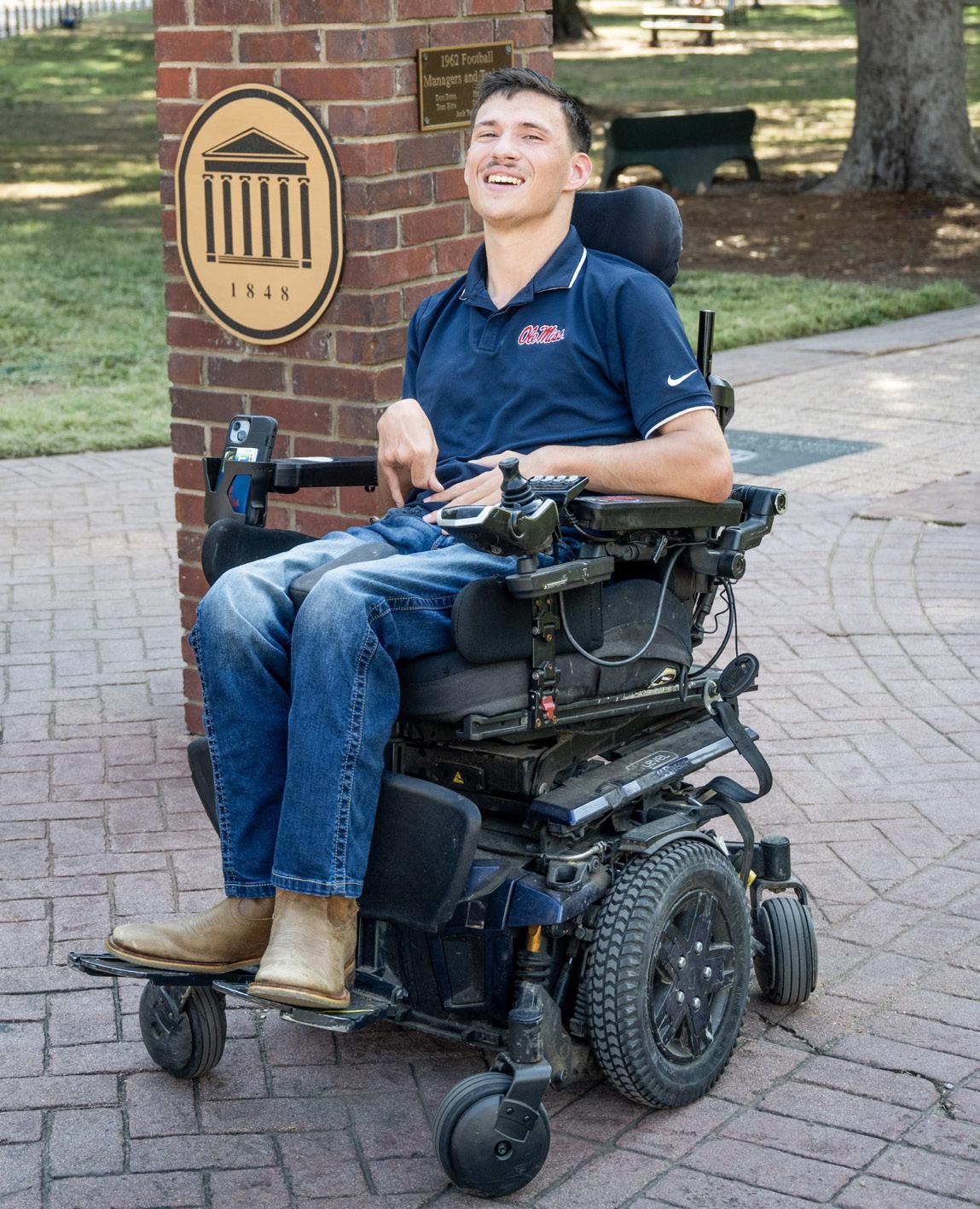
lution and Student Conduct.
Neal never received a disciplinary referral from the Office of Conflict Resolution and Student Conduct.
Batte declined The Daily Mississippian’s request for an interview with Reycraft on her behalf. Batte also declined for Student Housing to comment on Neal’s case due to federal student privacy laws.
Neal said he had no choice but to violate student housing policies to ensure his medical needs were met. He believes his situation demonstrates the difficulties faced by students like him, whose physical disabilities make it difficult to perfectly abide by university rules.
“The university’s personal care attendant (PCA) policy, in place since 2017, is designed to ensure the safety and security of residential communities while supporting students’ independence and choice of assistance,” Batte said. “Students are required to identify their PCA, who must complete the necessary paperwork and background check before being granted residence hall access.”
Batte said that while paperwork is being processed for a new PCA, students can check PCAs in as guests during visitation hours, and friends or family may also assist under hous-
ing policies. Neal, however, could not physically leave his bed to check PCAs in for morning visits, violating housing policy by lending his student ID to friends or unofficial assistants and not checking them in.
“Violating student housing policy can result in a warning or a referral to the Office of Conflict Resolution and Student Conduct, depending on the circumstances,” Batte said.
The slow pace of progress to improve accessibility at UM has worn heavily on Cleveland. This year, she is taking a step back from her previous position as ASB principal of accessibility to serve as special advisor to the president for accessibility. She will continue her passion for helping students like herself from a supervisory role.
“When I was choosing a school, I thought if it’s not as handicap accessible as Mississippi State University … I’ll find a way to work around it,” Cleveland said. “It just had to be Ole Miss. That is why I do what I do. I want other students to say the same thing — it just has to be Ole Miss.”
CONTACT THE NEWS DESK AT thedmnews@gmail.com
THE DAILY MISSISSIPPIAN EDITORIAL staff
CLAY HALE editor in chief dmeditor@gmail.com
RAEGAN SETTLE managing editor dmmanaging@gmail.com
SYDNEY STEPP copy chief thedmcopy@gmail.com
CAMERON LARKIN digital editor dmdigitaleditor@gmail.com
AIDAN PONIATOWSKI news editor thedmnews@gmail.com
NOAH WALTERS assistant news editor thedmnews@gmail.com
JAYLYNN CONNER arts and culture editor thedmfeatures@gmail.com
JESSICA JOHNSON assistant arts and culture editor thedmfeatures@gmail.com
RUSS EDDINS sports editor thedmsports@gmail.com
NATE DONOHUE assistant sports editor thedmsports@gmail.com
KADIN COLLIER opinion editor thedmopinion@gmail.com
OLIVIA CANGELOSI photo editor thedmphotos@gmail.com
JOURNEY GLOVER assistant photo editor thedmphotos@gmail.com
MADELYNN LIBERTO design editor thedmdesign@gmail.com
FARIDA BELAL assistant design editor thedmdesign@gmail.com
MARY EVANS multimedia coordinator dailymissmedia@gmail.com
AVERY THOMAS social media manager thedmsocialmedia@gmail.com
CADENCE MANNING assistant social media manager thedmsocialmedia@gmail.com
S. Gale denley student media center
LARZ ROBERTS Director of Student Media
DENNIS MOORE Editorial Director
dent activity fees, which the opinion labeled state funds.
In the wake of this law, events such as Oxford Pride have seen funding from the university cut.
How are RSOs being affected?
Junior Riley Mickelson is struggling with how to proceed as the leader of the Ole Miss Book Club, an organization that pays for its book purchases through SAF funding.
Upon learning that her group will not receive funding this semester, Mickelson was shocked, but she pointed out that many other groups are facing a similar situation and expressed a desire for an equitable solution.
“The Ole Miss Book Club is just one of many communities that are impacted by the loss of our SAF funds,” Mickelson said. “I hope the Mississippi Legislature and courts can recognize the severe consequences of this bill on students and their self-built communities.”
The lack of SAF funding challenges the foundational mission of the Ole Miss Book Club.
“We believe that all people, no matter their background, should have access to the same opportunities, including reading and discussing a
continued from page 1
a minimum of one term as an elected member of the senate or one term as parliamentarian or legislation monitor on the executive council of a previous vice president.
The first time the amendment was presented to the senate, it was debated and questioned thoroughly for over an hour. Now that the amendment has successfully passed through the senate twice, it will be put through a petitioning period and then promptly sent out in a ballot for the student body to vote on.
Four senate bills were unanimously passed in quick succession. All four bills were presented by the committee of governmental operations in an effort to make election processes more efficient with less rigid guidelines regarding the election timeline.
“We try to keep the code, I don’t want to call it vague, but you don’t want to box in different things. … We call it cleaning up the code,” Chairman of Governmental Operations Andrew Nichols said.
The bills will loosen restrictions regarding the timing around election, election certifications and general election processes. They were passed with hopes that the timing around ASB election processes would be easier to plan.
The senate swore in a number of nominees. This includes nine students for legislative aide positions, three for the secretary’s department and four election commissioners
variety of books,” Mickelson said. “Asking our members for dues to supplement SAF funding is an unnecessary barrier that should not, and will not in the Ole Miss Book Club, become normalized.”
Junior Eli Nordstrom halted registering an RSO focused on religious ministry to the homeless population in Memphis due to the funding cut. The SAF funds would have bolstered his organization’s ability to meet the material needs of those being helped.
“The initial plan was to use money provided by the university to address the needs of the homeless population in Memphis. I later learned that the university was no longer providing these funds to RSOs due to changes in the federal government’s policy,” Nordstrom said. “Because of this, our group will have to rethink our approach.”
Nordstrom is questioning whether it is still worth registering his organization as an RSO, but he is determined to proceed with the aim of being inclusive and helping others.
“While the founders of the club were all Roman Catholic, we recruited many like-minded people from several of the Protestant clubs on campus,” Nordstrom said. “We still fully intend to organize and live out the Gospel, but this change in policy has emerged as a roadblock. The aims of our organization are not partisan. Ultimately, our aim is to serve others as we are called to do.”
Which activities will continue to receive funding?
The initial email concerning the funding freeze from Wilkin dated Aug. 29 stated that, on account of the DEI ban bill, “the ability of registered student organization to put on certain programming using student activity fees” was restricted, leading to “the university (sic) creating a new process for putting on student activities this school year.”
The Daily Mississippian asked Batte what was meant by “certain programming” and which types of programming would receive funding under the new model but did not receive an answer to this question directly in his Sept. 10 email.
Mississippi Institutions of Higher Learning Director of Communications John Sewell emphasized that the programming funded will be consistent with state and federal law, wherever that stands.
“Universities are using these funds to support student activities following state and federal law, including the First Amendment’s requirement that student activity fees be used in a viewpoint and content neutral manner,” Sewell said in an email to The Daily Mississippian.
Will any RSOs continue to receive funding?
All campus organizations that receive SAF funding from
the university have found that this support has been cut. It remains unclear which, if any, organizations may receive funding in the future.
The Student Activities Association, a campus organization focused on providing student-focused events, did not respond to The Daily Mississippian’s question of whether the group will still receive funding.
What will happen to the SAF money already paid?
Students pay for SAF in their tuition, which could call into question where the funds are being allocated if not to RSO programming.
In an email dated Sept. 5 from The Daily Mississippian, Batte was asked what will happen to the funds students have paid into the SAF fund, but he did not address this question in his comment.
What is ASB doing to bring back SAF funds?
When asked what the ASB planned to do in response to this situation, ASB President Jack Jones redirected The Daily Mississippian to a statement released on Aug. 29 via the official ASB Instagram account.
“(T)he Mississippi Legislature has placed the university in a position where we cannot continue dispersing student activity funding without violating either state or federal law,” Jones said in the state -
ment. “These recent changes will have serious implications for our student organizations. Primarily because many of our student organizations rely almost exclusively on funding from the SAF … Over the coming weeks, I will be meeting with student leaders from other Mississippi institutions as we work to ensure the SAF process is returned to the hands of students — where it belongs.”
What are other Mississippi universities doing?
Other institutions throughout the state face their own student organization funding challenges in grappling with the law. At Mississippi State University, student funds will remain “unused and untouched this fall,” as student organizations will be directed to get involved in “fundraising workshops (that) work to connect groups with local businesses,” according to an article by Kate Myers in MSU’s student paper, The Reflector. The Daily Mississippian is reaching out to other state universities to find out how they are handling the situation.
CONTACT THE NEWS DESK AT thedmnews@gmail.com

for the judicial department.
The ASB Senate also consented to senate proclamation 25-6, which would acknowledge the Ole Miss students, faculty and staff that have died. All nine committee chairs came together to write and present this proclamation to the ASB Senate. President Pro Tempore Wesley Templet was one of those nine that presented the proclamation.
“I have the intention of recognizing important events that have happened to the University of Mississippi,” Templet said. “One of the most important events that happens is when we lose a member of our campus be it student, faculty or staff member. … I have asked my fellow members of the rules committee to join me in recognizing them.”
Many senators felt a deep
connection to this proclamation, and it passed with not only a unanimous vote but also a standing ovation. Committee Chairman for Inclusion and Cross-Cultural Engagement Jalon Hightower was another member who introduced this proclamation to the board.
“The recognition of people’s lives isn’t an issue of debate,” Hightower said. “It shows that we have a senate
that is empathetic. It shows that we have a senate who can put away personal grievances with whoever it may be to come together as a collective and understand the importance of a piece of legislation like this.”
KENZIE HALL
News Staff Writer
H Squared Ladies Wear celebrated the opening of its boutique in Oxford with a ribbon cutting on Thursday, Sept. 4, at a new location on Commonwealth Boulevard in Oxford Commons. The store officially opened for business on Friday, Aug. 29.
The original H Squared opened in Cleveland, Miss., in 2012. The boutique carries more than 100 brands.
“Our desire is for you to look good on the outside so that you feel good on the inside,” according to the boutique’s website.
Kressie Lindsey is the manager of H Squared in Oxford. She previously worked as a sales associate at the Cleveland location.
“I am excited to see how it goes and how well it’s all going to turn out,” Lindsey said.
University of Mississippi alum Haley Kelly owns the boutique and attended the ribbon-cutting. She graduated from the university in 2011 with a degree in marketing communica-
tions — now known as integrated marketing communications.
When Kelly first arrived at UM, she wanted to major in fashion merchandising but discovered there was no such degree path on campus. Kelly pivoted to marketing communications.
When Kelly turned the tassel, she returned home to Cleveland to wait tables at her parents’ restaurant, unsure about what she was going to do.
That was when the first H Square Ladies Wear was born.
“In a way, I thought I was too young to open my own business,” Kelly said. “I just decided to go for it. I did research, got a loan and opened the (Cleveland) store in 2012.”
Kelly said she loved dressing up on Ole Miss game days during college and knew she wanted to work in fashion. Her eighth grade teacher reached out to her after seeing the opening of her first location, reminding her of journal entries she made in class discussing wanting to open her own store.
Kelly said she has always dreamed of opening a second lo-

cation of her store in Oxford; she plans to commute between the Oxford and Cleveland locations.
Anna-Douglas Taylor, a sophomore allied health studies major, expressed her excitement to be employed at the boutique.
“I’ve met so many new fac-
es already,” Taylor said. “It’s nice to have an upscale boutique on this side of town. The clothes here bring a unique style to Oxford that is different from the stores on the Square.”
The boutique’s website also highlights a goal to be inclusive and
provide every customer with clothing items they feel confident in, aiming to “meet the unique wants and needs of (their) customers.”
RAEGAN SETTLE Managing Editor
When faculty at the University of Mississippi enable their courses in Blackboard for the spring 2026 semester, courses will be automatically created in Blackboard Ultra, the mobile-friendly Blackboard display with new tools and artificial intelligence features. Instructors will no longer have the option to choose between the modern or original versions of the digital learning management system.
The university set a spring 2026 deadline for faculty to switch their courses to Ultra from the original Blackboard course view. Ultra has been a welcomed new resource for faculty who have made the transition, but the platform change is daunting to some who have yet to do so.
Blackboard users can differentiate the Ultra format from the original course view by the cleaner user interface — a horizontally oriented, all-white layout with learning modules positioned in sequential order on course homepages.
Brian Hopkins, deputy chief information officer for academic technology at UM, said that Ultra has been available to the university since December 2021, when
the university transitioned from operating Blackboard in its own data center to “running in the cloud,” or from a remote server.
The spring 2023 semester was the first term instructors were able to create courses in the Ultra format, according to Hopkins.
“There are a couple of things driving the change,” Hopkins said.
“One of which is that Blackboard, the vendor, will not support two course formats forever, right? Yeah, they have been a little bit cagey about exactly when they’re going to stop supporting the old format, but we know that that day is coming, and we want to be prepared for it.”
Accessibility is another factor motivating the official format transition. Ultra courses,
Hopkins said, better accommodate assistive technologies than original Blackboard courses.
“We provide a public service, and we have both a legal and a moral obligation to provide that student service to everyone who wants to use it, including people who have visual or hearing problems or limited motor skills or whatever it might be,” Hopkins said.
Hopkins did not have exact data on how many instructors or courses have yet to switch to Ultra, though he noted the significant progress

made by faculty toward this goal.
Kyle Fritz, professor of public policy leadership, offered positive reviews for Ultra’s administrative features and page speed.
“Marking attendance is quite easy to do and just feels a little bit more polished and user-friendly,” Fritz said. “I think it’s easier for me as faculty to be able to look at it and make changes and update things.”
He also lauded the more seamless experience students have when navigating courses on the streamlined Ultra platform.
“I think it’s also easier for students to be able to find things; before I would have to just put all sorts of readings in a folder you have to sort of go through, but here I just put the readings in the module,” Fritz said.
Some professors, however, are reluctant to transition to Ultra from the original course view. Amitesh Singh is a Ph.D. candidate teaching science courses for the first time this semester. He was uninformed about the upcoming deadline to switch to Ultra, so he started building his course in the original Blackboard.
Largely, Singh has been unimpressed. He has opted to utilize Box for his coursework because of the collaborative nature of his class assignments.
“I would have loved to start with (this course) in Blackboard, but I don’t think it’s user friendly for students and for me,” Singh said. “I was trying to do some kind of interactive quizzes and polling, which Blackboard doesn’t provide, as far as I know.”
Blackboard Ultra does offer a tool called Collaborate Ultra, which may allow Singh to better employ the new platform in his courses.
Collaborate Ultra provides virtual classrooms and meeting spaces for instructors and students. Instructors can facilitate live, interactive
online learning sessions through the live chat and screen sharing available through this Ultra tool.
The platform also introduces an AI Design Assistant that aims to save instructors time building their courses, according to the Blackboard website. The AI Design Assistant gives instructors the option to auto-generate modules, modifying the level of content complexity and generating custom images. Instructors can also AI generate rubrics, journals, question banks, assignment prompts, test questions and more.
Auto-generating course modules may raise ethical concerns if teachers are using AI to create the content they are being paid to teach. As a philosophy professor in the public policy leadership department, Fritz expressed ethical concerns with both student and teacher usage of the AI features that come with Ultra.
“Obviously, I don’t want them to be using AI to write a paper or come up with their own arguments or come up with objections that I want them to think about, because the point is to get that critical thinking skill set,” Fritz said. “But I also try to make it clear for them that it’s a two-way street. It’s a trust thing. I’m not going to use AI to grade your papers. I’m not using AI to make my content. So you also should not use AI. Don’t give me AI to grade.”
Ultra also offers AI conversations, including role-play exercises and Socratic questioning.
“I appreciate what that tries to do, which is get students to think in various ways,” Fritz said. “But I also wouldn’t want them to feel like they don’t need to come to office hours or talk to me. … I don’t want that to be seen as a replacement for standard office hours or asking questions in class.”
Singh voiced concern for instructors who have yet to seek tech-
nological support and must switch to Ultra over winter break. While professors were first made aware of the deadline to transition to Ultra more than a year ago, some have stuck with the original course view out of habit or reluctance to change. Simply copying and pasting courses from the old format to the new interface resulted in some unwanted formatting changes for many instructors. Fritz found it easiest to rebuild his courses in Ultra from scratch, which allowed him to reevaluate course content during the process.
“I knew that we were going to be switching over to Ultra, and I wanted to revamp those courses a little bit anyway and update some of the readings and what we cover,” Fritz said.
The Faculty Technology Development Center (FTDC), a team of three information technology professionals in Weir Hall, provides tailored assistance to instructors navigating the transition. Ultra training sessions via Zoom have been a popular option for instructors through the FTDC, though Hopkins highlighted the variety of resources offered outside of Zoom training.
“We will be as high or low touch as you want us to be,” Hopkins said. “If you’re an instructor and you want a lot of help building your course, then we’ll give you a lot of help building your course. If you’re an instructor and you feel confident that you can handle it and you want us to leave you alone except for individual, discreet questions that you have about how to do a specific thing, then we’ll answer those questions that come up.”
SHAYNA BARNES
A&C Staff Writer
Ranked “Most Beautiful Campus” by several national publications, including USA Today, the University of Mississippi is brimming with “sweet spots” that cater to student interests and foster love for the school’s culture. From specific monuments to common campus staples, these landmarks are beloved by students.
The Lloyd Bell Tower, standing 60 feet tall, anchors the north end zone plaza of Vaught-Hemingway Stadium. Senior music education major Coda Ethridge recalls his first impression of the tower as a former member of the Pride of the South.
“We would march past it to go into the stadium, and I saw people lined up,” Ethridge said. “I’m like, ‘Why are you lined up for a bell?’ I didn’t know you could ring as many times as you want. The hype videos of the football team always shows them ringing it at the start of the game, so seeing the bell tower (now)
feels like it stands for competitiveness — that SEC feel, you know — ain’t nothing like it.”
Vaught-Hemingway Stadium, with a 64,038 seating capacity, is iconic on campus and loved by Ole Miss fans nationwide. For freshman journalism major Nyla Lemons, the stadium became a standout when she participated in the “Build the M” event, where freshmen form the university’s M logo on the football field.
“This is cliché, but I love the football stadium because I’m a journalism major wanting to go into sports,” Lemons said. “(I’d) never been to a college football game before, so when we did Build the M, I was in shock and just looking around, I said, ‘Okay, this is home.’”
The Turner Center is a 155,000-square-foot facility providing recreational activities such as pickleball, weightlifting and lifeguard lessons to both students and faculty. Senior exercise science major Amarian Phillips expressed his personal preference for the basketball courts.
“All of my classes are in Turner Center, and I love
playing basketball. So that’s where I spend all my time,” Phillips said. “My friends Keith Taylor, Tyler Dancy and Kobe Jones — we all play club basketball together. We go to have fun, but we also compete and try to push each other.”
Nutt Auditorium seats 395 people and is nestled inside the music building on University Avenue. The small space was praised by junior music performance major Lucy Elfert, who equates compact space with intimacy.
“It makes me feel really happy as a performer to see people showing up and most of all paying attention,” Elfert said. “I’ve performed at Gertrude Ford Center, The Pavilion, I’ve sung the National Anthem at the baseball field a couple of times — it’s so big I can’t see anyone. … Nutt Auditorium makes you feel more connected with the audience, and having a supportive, focused audience really makes us feel better.”
CONTACT THE A&C DESK AT thedmfeatures@gmail.com
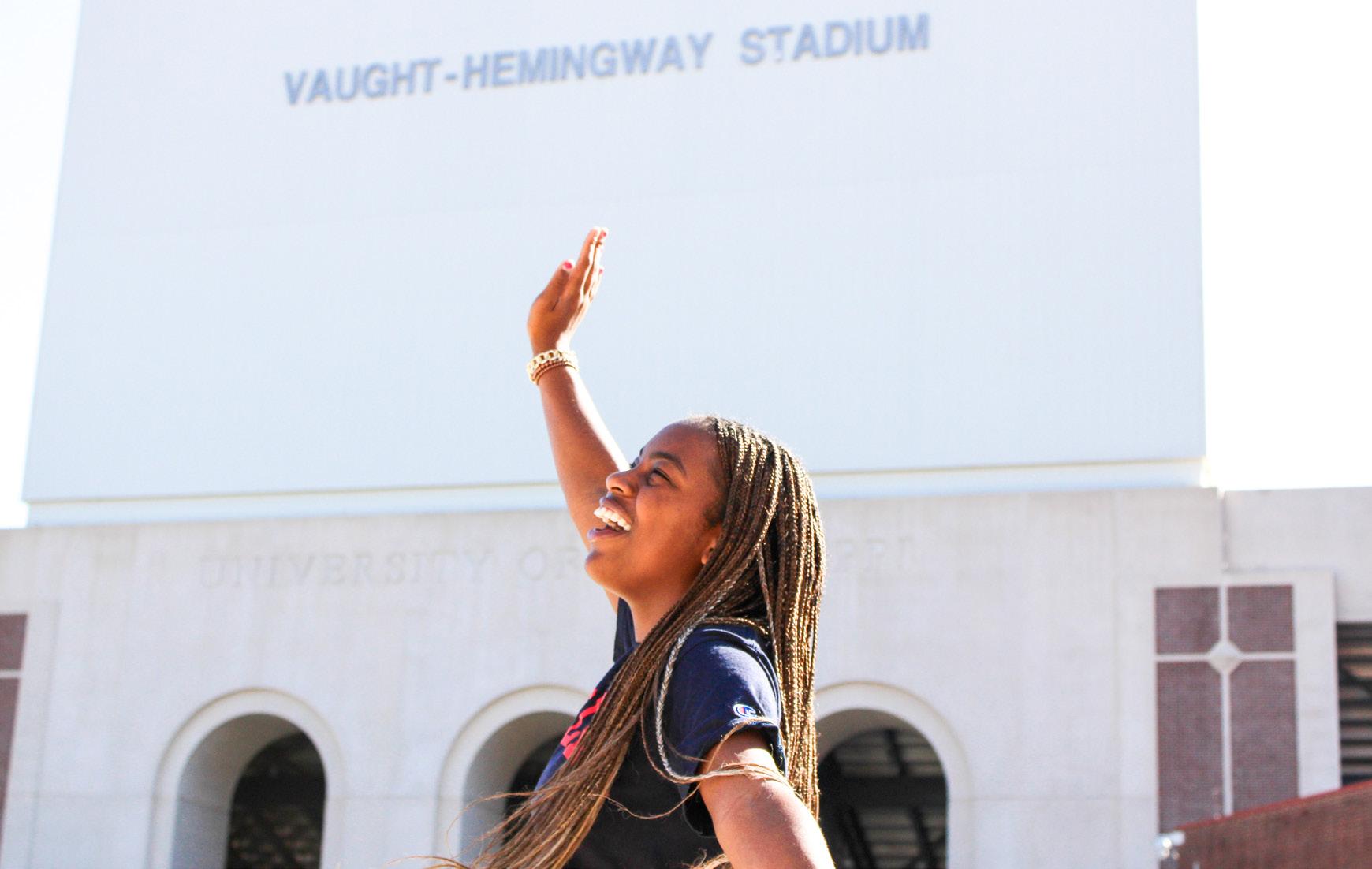
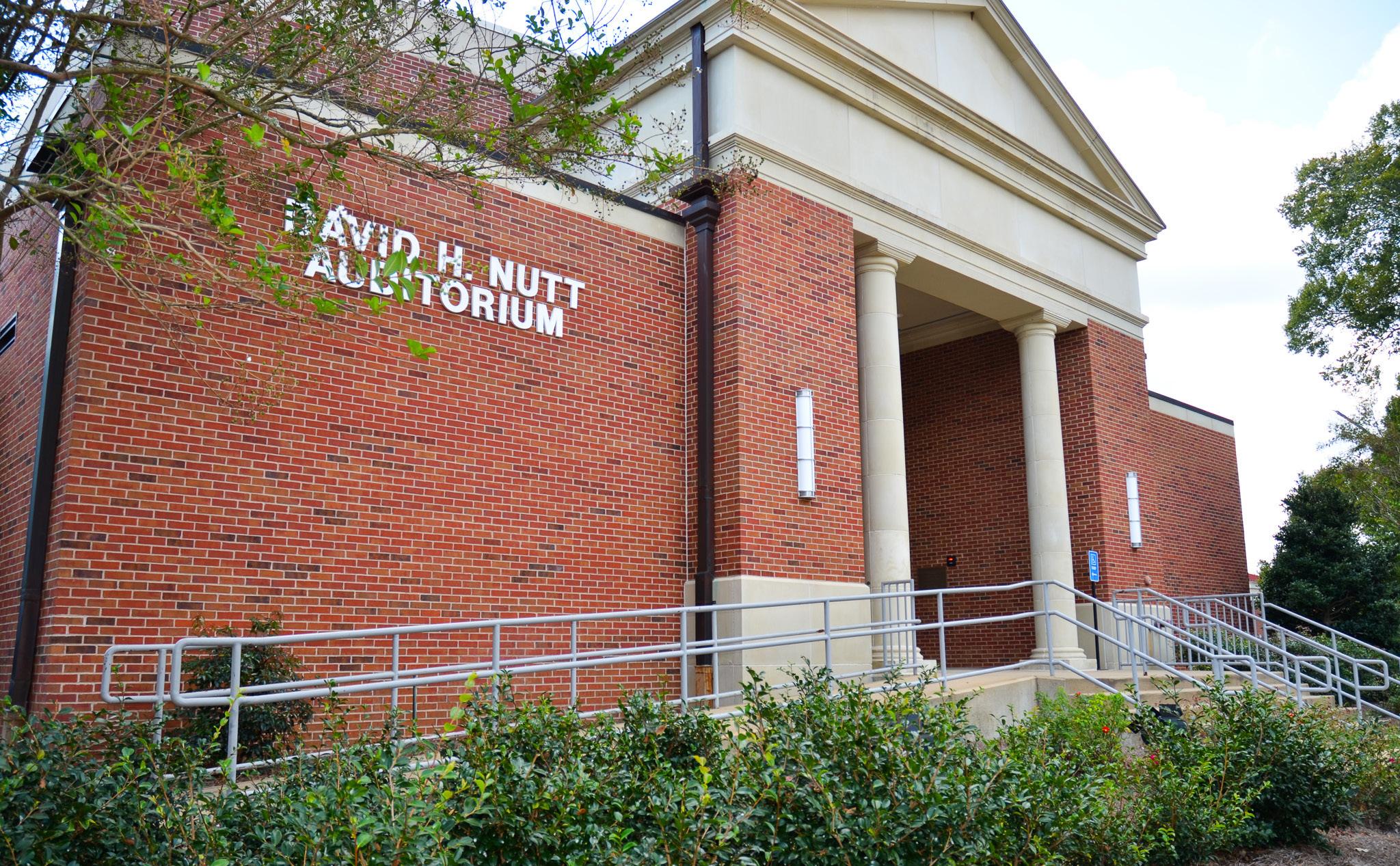
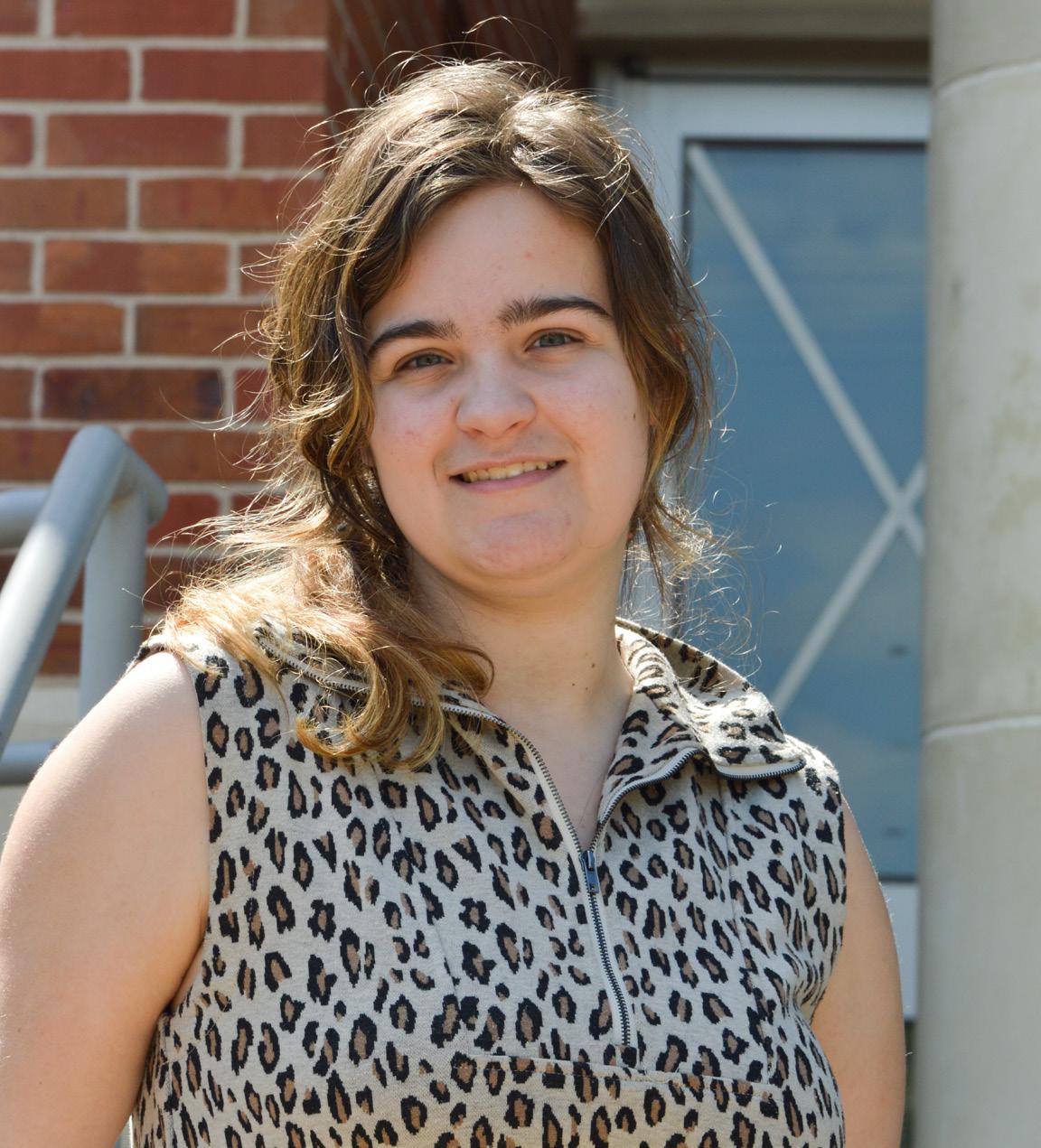

TAYLOR HILL
A&C Staff Writer
When Tonya Rogers started working at the University of Mississippi in January, she had no clue that her first year would include a personal revelation. Less than a mile from her office is a painting of herself and her childhood friend created by her late uncle, Michael Rogers.
Tonya Rogers, a Memphis native, serves as the Career Center’s assistant director of career development, though she did not plan to build a career in Oxford.
“I really had no other intention of ever coming to Oxford, and (I) just so happened to get the job,” Rogers said.
As she began the new position, memories of her uncle’s time at the university resurfaced. What seemed like small childhood memories now carried much more emotion.
“I remember going to pick him up when, I guess maybe it was the end of the semester … me (and) my cousin were in the back of the pickup truck, and once we picked him up, his boxes and things were in the back with us,” Rogers said.
Michael Rogers earned his Master of Fine Arts in painting from UM in 1981. He was an accomplished realist paint -
er who captured a range of scenes, from simple objects such as dishes in the sink to meaningful family portraits — one of which features Tonya Rogers and her childhood friend Melissa. The painting is displayed in the Lyceum.
“People admire that painting because of the details, the expression of joy on the girls’ faces,” Tonya Rogers said. “They always ask who they are, and they had never known who the girls were.”
For Rogers, the painting’s presence at the university was unexpected. Her family thought the painting had remained in the possession of the Smithsonian Institution, one of the many prestigious galleries where Michael Rogers’ art has been exhibited.
“He never really mentioned anything about his art still being here on campus,” Rogers said. “For all we knew, all his art was still at home or (with) other family members or wherever he had given the art.”
Her uncle practiced art and photography as a hobby, but his work reached great heights. By the time he graduated from UM, his artwork had been collected at the White House, the National Museum of American Art and the Metropolitan Museum of Art.
Michael Rogers died on
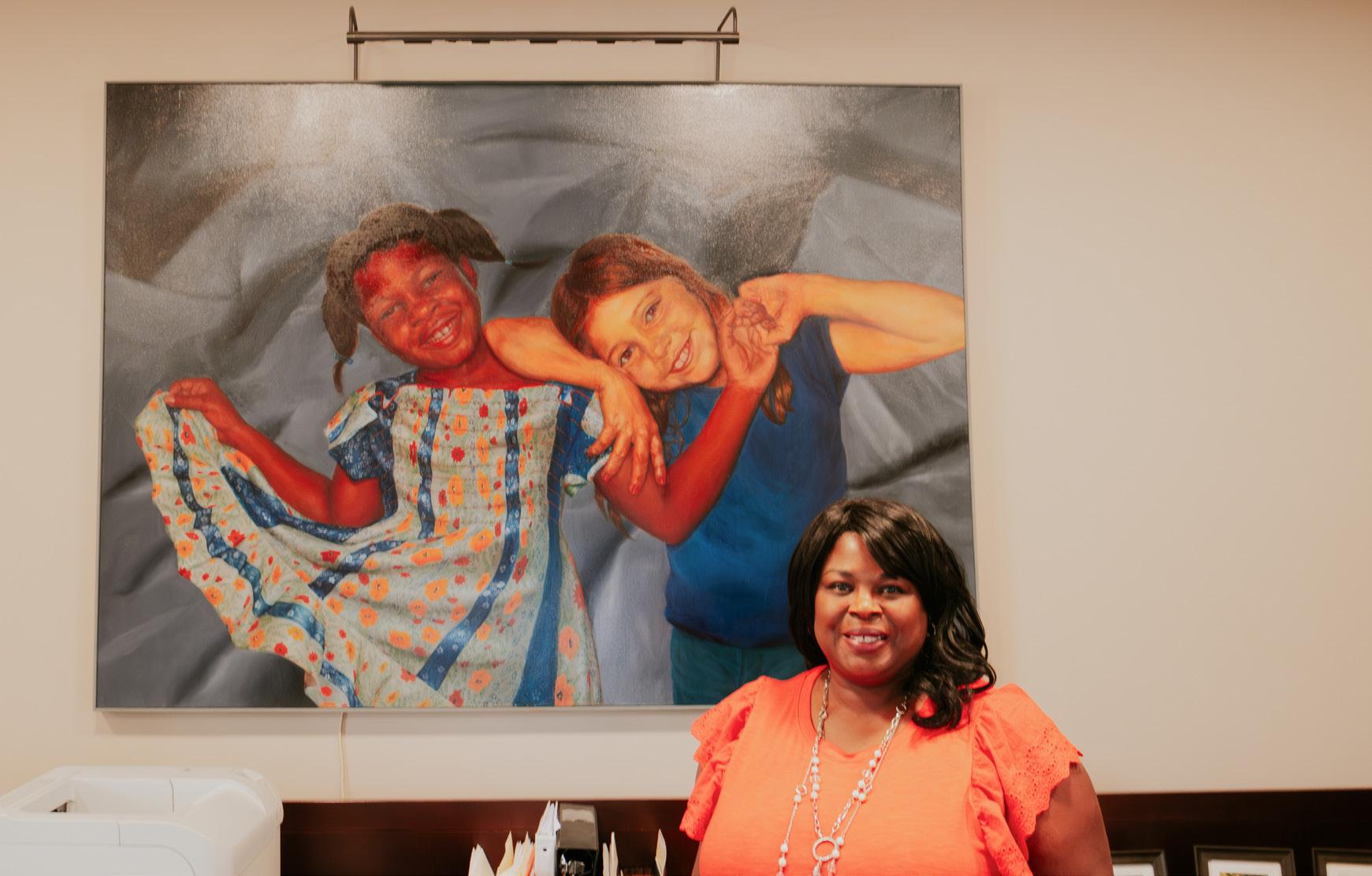
Aug. 3. After attending his wake, Tonya Rogers returned to work with a copy of his obituary. She showed it to her boss, Toni Avant, in hopes she would remember him from her own time at UM. That conversation led to an unexpected emotional realization.
“We walked in and walked to the office and there, right
down the hallway, was this big picture, and it’s a picture that my uncle painted,” Rogers said. “It was the same (as the) one in (his) obituary — (the painting) of me and my friend.”
The discovery was emotional for Rogers but also for Avant and the other staff members. Many were mistyeyed by the timing of this con -
nection so soon after his death.
“When I saw that painting on the wall, it was just kind of like, ‘Oh my God, I guess I need to be here because the painting of me that my uncle did is literally on the wall,’” Rogers said.
CONTACT THE A&C DESK AT thedmfeatures@gmail.com
‘We are as relevant as we’ve ever been’
years
ALANA BROWN-DAVIS A&C Staff Writer
This past weekend, the Lafayette County and Oxford Public Library, a branch of the First Regional Library system, was filled with noise. Blasts from party horns bounced off the walls and voices rang throughout the building as the library system celebrated its 75th anniversary.
Amy Bluemel, an award-winning Native American storyteller, entertained an audience of all ages with Chickasaw history and tales. Attendees also enjoyed a variety of refreshments from Manilla Skillet and birthday cake from Cakes by Jan Jan.
When reflecting on the important milestone, First Regional Library Director Lori Barnes pointed to the library’s rich history.
“I know what it took back in 1947 to get this library system started,” Barnes said. “There was a group of 12 women in our region who said, ‘We need a multi-county library system to serve and provide library services.’ In 1950, their dream became a reality. And having been someone who was in their 34th year of public librarianship, I’ve seen the changes through all that time.” Head librarian Merid-
ith Wulff added that the Lafayette County and Oxford Public Library’s history stretches beyond 75 years.
“I love learning about our library’s history and our library system’s history, and the fact that this library, the Lafayette County and Oxford Public Library, has been here for 95 years,” Wulff said. “Our library system has been here for 75 years, and it started as a way to share resources among counties. It was, in fact, the first regional library system in Mississippi, and they came together to share resources to improve access to their communities.”
Wulff expressed her love of the library system and its passion to work with the communities they serve.
“(Libraries) are one of the very last places where people can go and not spend any money to just be,” Wulff said. “Public libraries now think of themselves as community hubs. Books are at the heart of it, learning is at the heart of it.”
Barnes also pointed out some of the services that the local library offers its community.
“We are promoting literacy all the time for children, but especially in the summertime, because parents are looking for something free and fun and educational to do with their children in the summer -
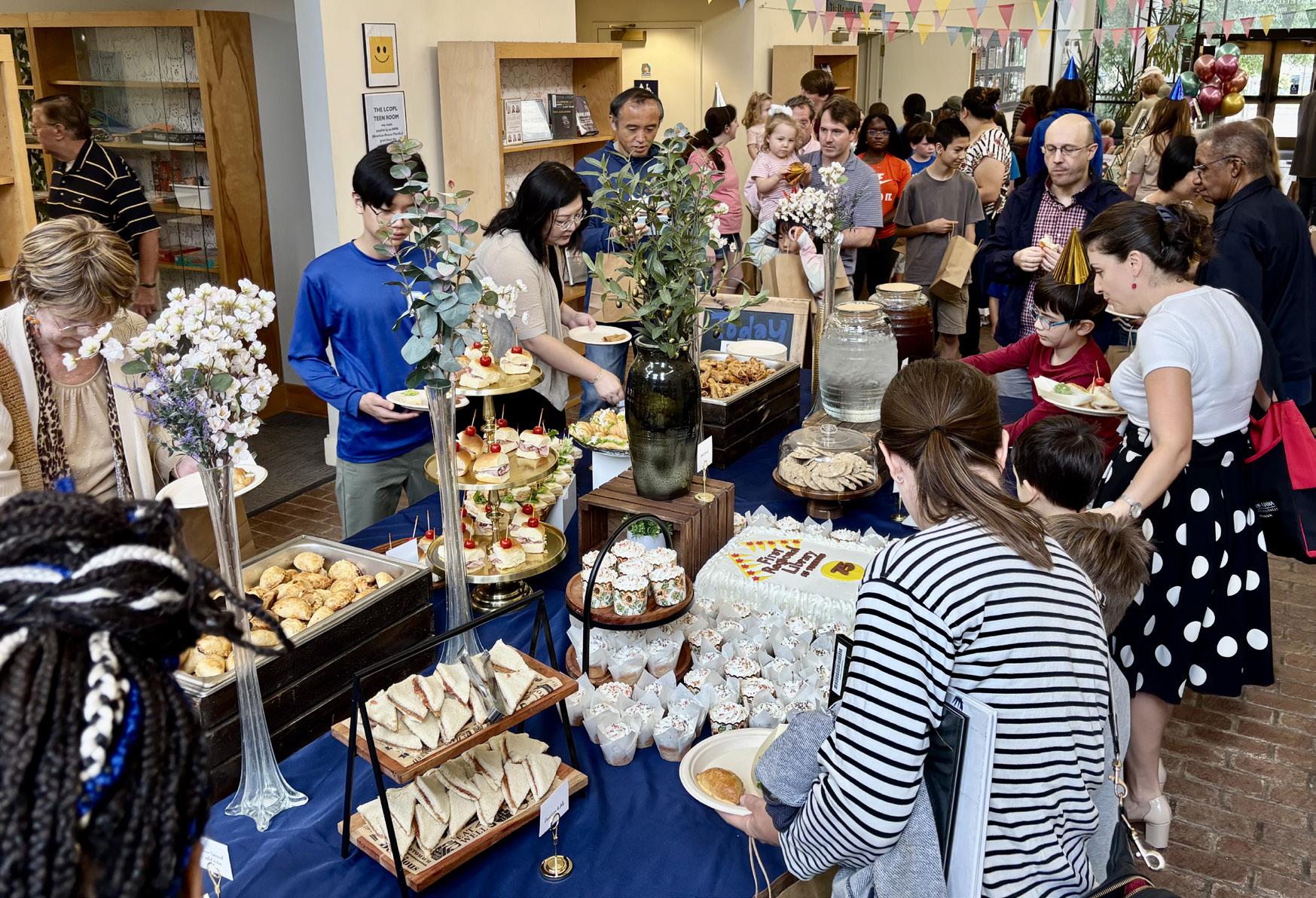
Attendees pick out hors d’oeuvres at the First Regional Library system’s 75th anniversary celebration at Lafayette County and Oxford Public Library.
time,” Barnes said. “Public libraries are fulfilling that need, and in the process promoting and sustaining literacy.”
Both Barnes and Wulff believe that libraries are alive and well despite existing in a time where many people opt for digital works instead of the tangible ones that libraries offer.
“One point I would really like to make (is that) a lot of people think and profess that they believe that the internet is taking the place of the public library, and libraries are not as relevant as they used to be because of the internet. (This) is so untrue,” Barnes said. “We had 62,000 patrons in our li-
brary in the month of June 2025. A large chunk of those were here at Oxford. But we are as relevant as we’ve ever been.”
AVERY SMITH Sports Staff Writer
Ole Miss Baseball and Softball teams welcomed the League of Angels to Swayze Field for a night of faith, fun and baseball on Monday, Sept. 8. The event brought together those with disabilities from a variety of age groups for a one-of-a-kind game experience.
League of Angels is a baseball ministry founded by Tanner Kim, a former University of Kentucky baseball player. Kim began the company a year and a half ago in Knoxville, Tenn.
Monday’s event marked the organization’s first time both at a university and in a different state.
For Kim, the expansion is about more than baseball: It is about spreading joy and God’s love through the sport. He arrived at the idea for League of Angels during his days playing at Kentucky.
After volunteering at a baseball game for athletes with disabilities with the Miracle League — an organization dedicated to giving young athletes with disabilities access to baseball — Kim realized that baseball was about more than performance on the field. He said his faith was instrumental in assembling this organization.
“The pastor was talking about how sometimes you put down a gift that God’s given you, and then it might be time to pick it back up and use it for something else,”

Kim said in an interview with UT’s Haslam College of Business. “That was soon after I decided to step away from baseball, so it really hit home for me. I felt like God put it in my heart to start this foundation.”
The evening began with the “Angel March” in which participants, referred to as angels, were escorted onto the field by members of Ole Miss Baseball and Softball. Families, friends, Greek life organizations, Bible study groups and the local Oxford High School baseball and softball teams gathered to welcome each angel while cheering and parading signs.
“The League of Angels event brought such joy to everyone in attendance,” junior history major Ava Murphy said. “Watching the teams cheer on the angels and champion them on the stage of the Ole Miss Baseball field was beautiful.”
After this warm welcome, two teams took the field: Team Hotty in red and Team Toddy in powder blue. Every angel walked out with an Ole Miss baseball or softball player. Both teams were assigned senior captains, and, just like a college game, players came through the tunnels as the announcers called out their names.
“It’s really uplifting to see the community come together to celebrate the angels,” UM alumna and event attendee Sara Grace Moore said. “It reminds us why sports matter so much – to bring us together and spread love and


• Former • Practiced the
positivity in a world that needs that right. You could really see God bringing everyone together out there to support the angels. It was a beautiful experience.”
Adding to the atmosphere, the speakers also played each player’s walkout song. Following the National Anthem, Cami Bianco — the wife of Ole Miss Baseball head coach Mike Bianco — threw the ceremonial first pitch.
Every hit during the game was a home run; each Angel hit
and ran the bases, celebrating under the stadium lights. Ole Miss players ran the bases alongside the angels, giving high fives and fistbumps along the way.





• Taught Procedure for
• A member 1981.
After the top of the first, everyone — angels, Ole Miss players and volunteers — gathered around the pitcher’s mound for a mid-game dance break before beginning the bottom half of the inning. Rebel athletes, angels and fans came together for a genuine moment of joy and community,
• Former years.
• Former years.
singing and dancing in unison. The evening concluded with a short scrimmage between the Ole Miss athletes and a group prayer. Of course, the real highlight of the night was the community formed. Whether at bat, in the field or cheering from the stands, everyone present helped make Monday night a testament to the unifying power of sports.
• Former Special Agent with the Federal
• Practiced at his privately owned law fi the same place, being the Oxford Square,
CONTACT THE SPORTS DESK AT
• Former Special Agent with the Federal Bureau of Investigation (FBI)
• Practiced at his privately owned law firm for 45 consecutive years- located at the same place, being the Oxford Square, Downtown, Oxford, Mississippi.
• Taught the Mississippi DUI Law and 5 different Criminal Law and Criminal Procedure courses each and every semester at the University of Mississippi for 29 consecutive years.
• Former Association;
• Former Special Agent with the Federal Bureau of Investigation (FBI).
• Taught the Mississippi DUI Law and 5 Procedure courses each and every semester for 29 consecutive years.
• A member of the Chancellor’s Trust at The University of Mississippi since1981.
• Former Municipal Prosecutor for the City of Oxford, Mississippi for over 6 years.
• Still practices at his privately owned law firm for 55 consecutive years - located at the same place, being the Oxford Square, Downtown, Oxford, Mississippi.
• Appointed Attorney Mandatory Vice
• A member of the Chancellor’s Trust at 1981.
• Former Municipal Court Judge for the City of Oxford, Mississippi for 8 years.
• Former Vice President and President of the Lafayette County Bar Association; member of the Mississippi Bar Association, etc.
• Taught the Mississippi DUI Law and 5 different Criminal Law and Criminal Procedure courses each and every semester at the University of Mississippi for 29 consecutive years.
• A Founding Harvard
• Former Municipal Prosecutor for the years.
Appointed by the Mississippi State Bar to the Mississippi Commission on Attorney Ethics and Attorney Violations of the Canon of Ethics and All Mandatory Rules concerning the Practice of Law. Occupied the positions of Vice Chairman and Chairman served for 18 years.
• A member of the Chancellor’s Trust at the University of Mississippi since 1981.
• Former Municipal Prosecutor for the City of Oxford, Mississippi for over 6 years.
• A Founding Member of the National College for DUI Defense conducted at Harvard Law School.
• Former Special Agent with the Federal Bureau of Investigation (FBI)
• Selected Advocacy
• Former Municipal Court Judge for the years.
• Selected Satisfaction
• Former Municipal Court Judge for the City of Oxford, Mississippi for 8 years.
• Practiced at his privately owned law firm for 45 consecutive years- located at the same place, being the Oxford Square, Downtown, Oxford, Mississippi.
• Former Vice President and President Association; member of the Mississippi
• Selected as one of the Top 50 DUI Attorneys in Mississippi by the National Advocacy for DUI Defense.
• Former Vice President and President of the Lafayette County Bar Association; member of the Mississippi Bar Association, etc.
• Taught the Mississippi DUI Law and 5 different Criminal Law and Criminal Procedure courses each and every semester at the University of Mississippi for 29 consecutive years.
• Former Special Agent with the Federal Bureau
• Selected as one of the Top 10 Best Attorneys of Mississippi for Client Satisfaction Award by the American Institute of DUI/DWI Attorneys.
• Selected Organization.
• Selected as one of the Top 100 Trial Lawyers by the National Trial Lawyers Organization.
• A member of the Chancellor’s Trust at The University of Mississippi since1981.
• Former Municipal Prosecutor for the City of Oxford, Mississippi for over 6 years.
• Recipient of the DISTINGUISHED AWARD OF MERIT for 1989 from the Mississippi State Bar given to one Attorney in the State each year for outstanding contributions to the practice of law.
• Former Municipal Court Judge for the City of Oxford, Mississippi for 8 years.

• Appointed by the Mississippi State Bar to the Mississippi Commission on Attorney Ethics and Attorney Violations of the Canon of Ethics and All Mandatory Rules concerning the Practice of Law. Occupied the positions of Vice Chairman and Chairman and served for 18 years.
• Former Vice President and President of the Lafayette County Bar Association; member of the Mississippi Bar Association, etc. Appointed by the Mississippi State Bar to the Mississippi Commission on Attorney Ethics and Attorney Violations of the Canon of Ethics and All Mandatory Rules concerning the Practice of Law. Occupied the positions of Vice Chairman and Chairman served for 18 years.
• Practiced at his privately owned law firm the same place, being the Oxford Square,
• Voted “Best Attorney in Oxford, Mississippi” in the Grove’s Choice Awards.
Member of the American Association of Premier DUI Attorneys.
• A Founding Member of the National College for DUI Defense conducted at Harvard Law School.
• Recipient
• Appointed by the Mississippi State Bar Attorney Ethics and Attorney Violations Mandatory Rules concerning the Practice Vice Chairman and Chairman and served
• Taught the Mississippi DUI Law and 5 diff Procedure courses each and every semester for 29 consecutive years.
Vice
• A Founding Member of the National Harvard Law School.
Member of the National League of Renowned Attorneys- Top 1% Awarded the United States Congressional Medal of Distinction by RNCC.
• Member of the American Jurist Institute - Top 10 DUI/DWI Attorney for Mississippi
• Selected as one of the Top 50 DUI Attorneys in Mississippi by the National Advocacy for DUI Defense.
• A Founding Member of the National College for DUI Defense conducted at Harvard Law School.
• A member of the Chancellor’s Trust at the 1981.
• A Founding Harvard
• Selected as one of the Top 50 DUI Attorneys Advocacy for DUI Defense.
• Selected as one of the Top 10 Best Attorneys of Mississippi for Client Satisfaction Award by the American Institute of DUI/DWI Attorneys.
• Member of the American Society of Legal Advocates - Top 100 Criminal Defense Lawyers in the State of Mississippi.
• Selected as one of the Top 100 Trial Lawyers by the National Trial Lawyers Organization.
• Selected as one of the Top 50 DUI Attorneys in Mississippi by the National Advocacy for DUI Defense.
• Selected as one of the Top 10 Best Attorneys of Mississippi for Client Satisfaction Award by the American Institute of DUI/DWI Attorneys.
• Former Municipal Prosecutor for the City years.
• Selected by the Attorney and Practice Magazine as one of Mississippi’s Top 10 Attorneys, et cetera.
• Selected Advocacy
• Selected as one of the Top 10 Best Attorneys Satisfaction Award by the American Institute
• Selected Satisfaction
• Former Municipal Court Judge for the City years.
• Recipient of the DISTINGUISHED AWARD OF MERIT for 1989 from the Mississippi State Bar given to one Attorney in the State of Mississippi each year for outstanding contributions to the practice of law.
• Selected as one of the Top 100 Trial Lawyers by the National Trial Lawyers Organization.
• Recipient of the DISTINGUISHED AWARD OF MERIT for 1989 from the Mississippi State Bar given to one Attorney in the State each year for outstanding contributions to the practice of law.
• Selected as one of the Top 100 Trial Lawyers Organization.
Listing of these previously mentioned areas of practice does not indicate any certification of expertise therein.
• Voted “Best Attorney in Oxford, Mississippi” in the Grove’s Choice Awards.
• Voted “Best Attorney in Oxford, Mississippi” in the Grove’s Choice Awards.
• Member of the American Association of Premier DUI Attorneys.
• Former Vice President and President of the Association; member of the Mississippi Bar
• Member of the American Association of Premier DUI Attorneys
• Member of the National League of Renowned Attorneys - Top 1%
• Member of the National League of Renowned Attorneys- Top 1%
• Awarded the United States Congressional Medal of Distinction by RNCC.
• Selected Organization.
• Recipient of the DISTINGUISHED AWARD the Mississippi State Bar given to one outstanding contributions to the practice
• Recipient the Mississippi outstanding
• Voted “Best Attorney in Oxford, Mississippi”
• Awarded the United States Congressional Medal of Distinction by RNCC.
• Member of the American Jurist Institute - Top 10 DUI/DWI Attorney for Mississippi
• Member of the American Society of Legal Advocates - Top 100 Criminal Defense Lawyers in the State of Mississippi.
• Appointed by the Mississippi State Bar to Attorney Ethics and Attorney Violations Mandatory Rules concerning the Practice Vice Chairman and Chairman and served
• Voted • Member
• Member of the American Jurist Institute - Top 10 DUI/DWI Attorney for Mississippi
• Selected by the Attorney and Practice Magazine as one of Mississippi’s Top 10 Attorneys, et cetera.
• Member of the American Association
• A Founding Member of the National College Harvard Law School.
• Member
• Member of the National League of Renowned
• Member of the American Society of Legal Advocates - Top 100 Criminal Defense Lawyers in the State of Mississippi
• Selected by the Attorney and Practice Magazine as one of Mississippi’s Top 10 Attorneys, et cetera.
• Selected as one of the Top 50 DUI Attorneys Advocacy for DUI Defense.
• Awarded the United States Congressional
• Member of the American Jurist Institute Mississippi
• Selected as one of the Top 10 Best Attorneys Satisfaction Award by the American Institute
• Selected as one of the Top 100 Trial Lawyers
• Member of the American Society of Legal Defense Lawyers in the State of Mississippi
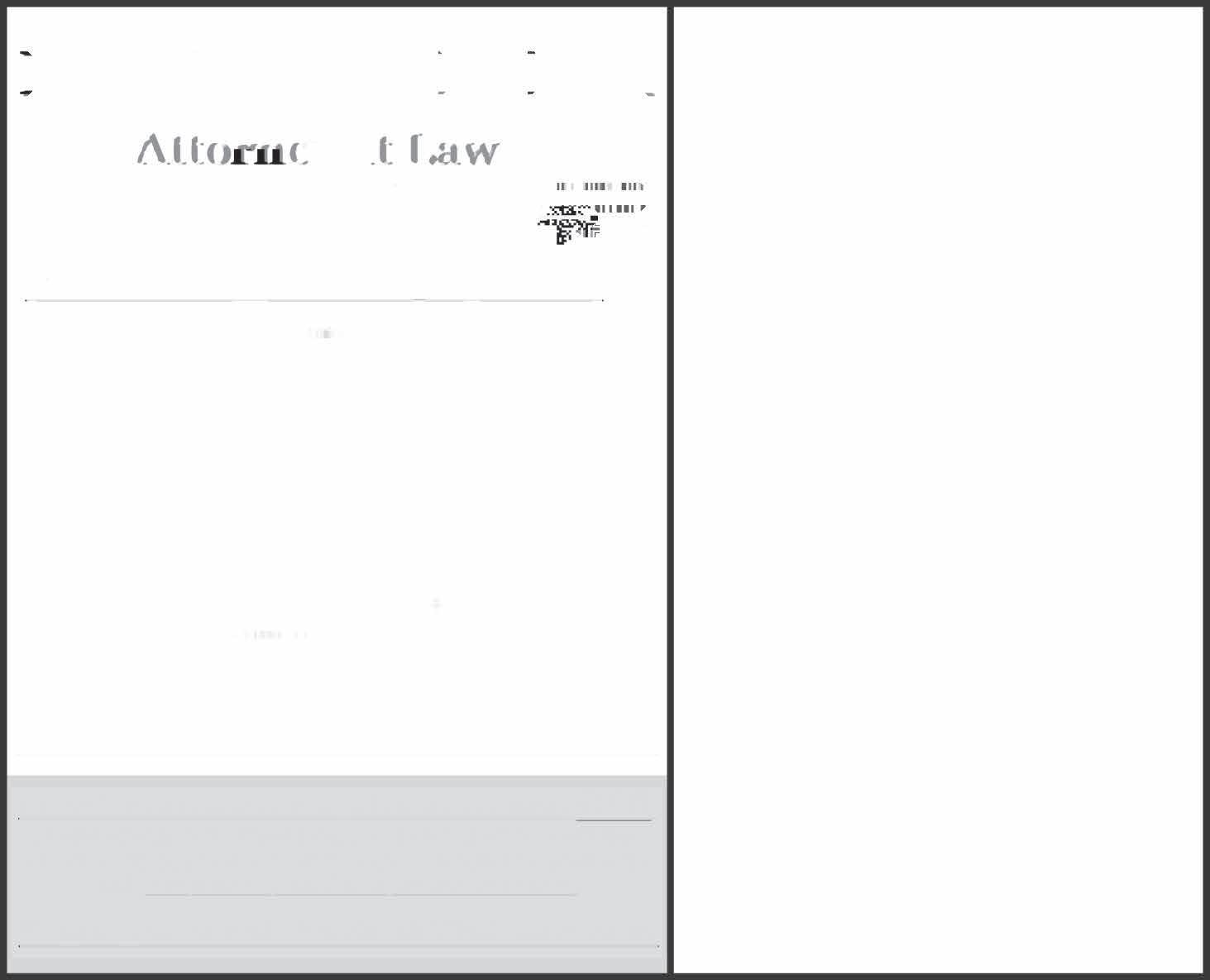
• Awarded • Member Mississippi • Member Defense
RUSS EDDINS Sports Editor
Ole Miss Football began SEC play last weekend with a road win against Kentucky. On Saturday, Sept. 13, the AP No. 17 Rebels will return home to face Arkansas — another big test for a team with College Football Playoff aspirations.
Arkansas enters this matchup unranked but undefeated at 2-0. The Razorbacks’ wins came against Arkansas State (56-14) and Alabama A&M (52-7). This Saturday marks the Razorbacks’ first SEC action of the season.
Arkansas quarterback
Taylen Green is a 6-foot-6inch, dual-threat signal caller. Over the past two weeks, he threw 10 touchdowns and rushed for another; his 11 total touchdowns lead the SEC. Last season, Green rushed for 602 yards, and he has continued to be aggressive on the ground this season.
Green ran for 151 yards in Week 1 against Arkansas State, but his 41 yards against Alabama A&M in week two were clouded by the two sacks he took.
Through two weeks, the Rebel defense tallied four sacks and 10 tackles for loss meaning, if the pass rush can get home, Ole Miss should be set up well.
Between Georgia State and Kentucky, the Rebel secondary has yielded only 128 pass -
ing yards per game. Green is a solid passer — he threw for 3,154 yards in 2024-25 — but he may struggle against his first SEC defense of the season.
The Razorbacks’ top wide receiver, O’Mega Blake, has 12 receptions for 185 yards (15.4 per reception) and two touchdown catches on the season. Blake has the potential to break the game open, as evidenced by his 121yard Week 1 performance.
The Ole Miss defense has found itself in some tough, short-field situations this season resulting from quarterback Austin Simmons’ four interceptions. However, if Simmons can clean up the turnovers like he did in the second half of the Kentucky game, the defense will be in a better position to keep points off the board.
This may be easier said than done, though. Simmons and the offense have struggled early in both games, scoring just seven total first quarter points — due, in large part, to Simmons’s turnovers, all of which have come in the first 15 minutes.
Arkansas’s defense will be the most talented the Rebels have faced on paper this season. Linebacker Xavian Sorey Jr. is Arkansas’s biggest threat; the senior has 16 total tackles, half a sack, one forced fumble and one interception this season.
The Arkansas defense as a whole has six sacks and 20 tackles for loss this year. De -
fensive end Quincy Rhodes Jr. leads the team with three sacks, and fellow defensive end Philip Lee is tied with Rhodes as the team leader in tackles for loss with three.
Rebel running back Kewan Lacy has provided relief from Simmons’ woes. Lacy leads the SEC in rushing yards with 246, and his four touchdowns are nothing to sneeze at. Last week, the Rebels leaned on him as a workhorse, and he proved he could manage the load to the tune of 138 yards and a touchdown on 28 carries.
To complement Lacy’s success in the run game, Ole Miss is also home to the SEC leader in receiving yards: wide receiver Harrison Wallace Jr. Last week, Wallace’s 55-yard catch-and-run on 4th-and-1 in the second quarter proved to be a turning point early, and his 43-yard catch in the third quarter kept Simmons in rhythm to set the Rebels up for another touchdown.
Wallace has steady hands and big play ability; if Simmons can remain composed, Wallace has a chance to tear apart the Razorback secondary.
Ole Miss got the job done against Kentucky, but Simmons cannot afford to be careless. Though Arkansas has yet to play a Power 4 program this season, the Razorbacks’ big wins in the first two weeks demonstrate that they are capable
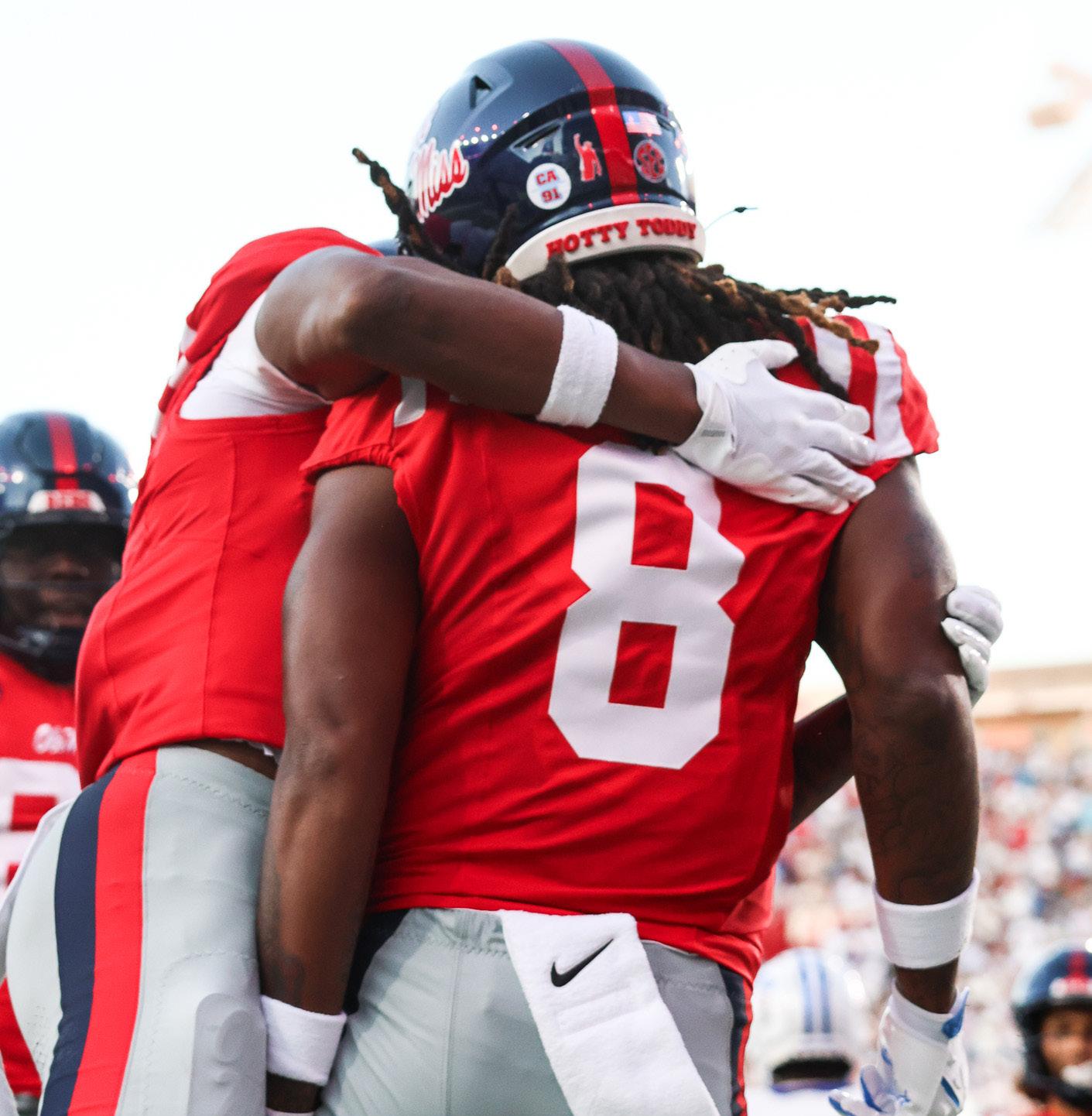
of running away with games.
Since 2014 to 2018 (when Arkansas won four games in a row against Ole Miss), neither Ole Miss nor Arkansas have won three in a row in this rivalry. The Rebels look to get their third consecutive victory against the Hogs for the first time since 1990-93, when Ole Miss won four in a row.
This Week 3 matchup is an opportunity for Simmons to prove his stature as a starter and establish Ole Miss as one of the best teams in the country.
CAMERON LARKIN Digital Editor
A Doak Walker Player National Player of the Week awardee, the leading rusher in the SEC and a pass blocking merchant, Ole Miss running back Kewan Lacy has transformed the Rebel run game from an afterthought last season to a force to be reckoned with to start this season.
“I mean, (Kewan Lacy’s) just really good, you know?” Ole Miss head coach Lane Kiffin said following the Kentucky game, played in Lexington, Ky., on Saturday, Sept. 6. “And, we had Quinshon (Judkins) for those two years, and he’s a great running back. But then we went a year without it (last season). You can see it’s hard. It’s hard in the SEC when the passing game is not working great or you’re not protecting,”
On Sept. 6, Ole Miss fought off Kentucky’s upset bid and held on for the 30-23 win — due in large part to Lacy’s efforts.
Lacy, a former Missouri Tiger, rushed 28 times for 138 yards and a touchdown against the Wildcats. Ole Miss found itself down 10-0 early in the second quarter when quarterback Austin Simmons connected with wide receiver Harrison Wallace for a 55-yard strike on fourth-and-1. Lacy then powered in Ole Miss’ first score of the game seconds later. Lacy’s vision, resilience and
elusiveness are impressive, but perhaps his most underrated trait is his pass blocking.
On the fourth-and-1 play prior to Lacy’s touchdown, Ole Miss ran a play action that forced Lacy into pass protection — a position he has succeeded in numerous times already this season. His efforts aided Simmons’ ability to find Wallace for the game-changing conversion.
During Tuesday’s press conference, Lacy emphasized the importance of physicality in pass blocking.
“I feel like it’s more so just a mentality,” Lacy said. “You have to go out there and be willing to put your body on the line and protect the quarterback at all costs.“
Lacy’s performance Saturday not only helped Ole Miss start the season 2-0, but also garnered national attention by earning him recognition as the Doak Walker National Player of the Week — an award given to the most outstanding running back.
“It just gives me like a boost knowing that I’ve been acknowledged for something, and I just feel like it’s just going to keep me driving forward,” Lacy said in Tuesday’s press conference.
Lacy leads the SEC in rushing attempts (44), rushing yards (246) and rushing touchdowns (4). Last season, Ole Miss had only one rusher in the Top 30 in the conference, and that was quarterback Jaxson

Dart at No. 30 with 495 yards.
In just two games, Lacy is already nearly halfway to Dart’s 2024-25 season total. To Kiffin, this improvement in the rushing attack is striking.
“(The ground game) was awesome. I mean, I just tell you how it is, we didn’t have that a year ago, and so it’s really good to have it back,” Kiffin said following Ole Miss’ season opener versus Georgia State.
“I was looking forward to that and kind of thinking (Lacy) was (going to) play like that because that’s how he practices.”
The 63-7 Week 1 win over Georgia State and last weekend’s win over Kentucky earned Ole Miss No. 17 in the AP Poll. ESPN’s 2025 SEC football preview placed the Rebels “in the running” for the College Football Playoffs. Lacy, though, is not daunted
by these high expectations.
“Really, I just take it day by day and whatever God gives me, you know, that’s what I just go with,” Lacy said. “And I feel like He is just giving me the best right now. So I’m thankful for that.”
TAYLOR HILL
Sports Staff Writer
Ole Miss Women’s Golf claimed first place at the Cougar Classic in Charleston, S.C., on Monday, Sept. 8 and Tuesday, Sept. 9, posting a team score of 834 (-18) with three players inside the Top 12. This is Ole Miss’ second consecutive tournament win after securing first place at the Boilermaker Classic in West Lafayette, Ind., last week.
Participants in the Cougar Classic included Ole Miss, Tennessee, Florida, UCF, Clemson, LSU, Virginia Tech, College of Charleston, Au -
burn, Furman, Boston College, NC State, Georgia, Miami (Fla.), Maryland, Penn State, Yale and Georgetown.
Sophomore Kajsalotta Svarvar led the Rebels at the end of day one. She opened with a 70 (E) in round one and followed that up with a 66 (-4) in round two to put her in a tie for second place for the day.
Junior Sophie Linder tied for 11th after the first day. She fired a 68 (-2) in round one but slipped with a 70 (E) in round two. She had five birdies and one bogey across both rounds.
Sophomore Mary Miller kept herself in contention, recording a 69 (-1) in round one and a 70 (E) in round two to finish the day tied for 15th.
Sophomore Filippa Sundquist and freshman Matilda Björkman tied for 26th after the first two rounds. By the end of day one, Ole Miss led the field in both total birdies and scoring on par-5 holes.
Day two
Svarvar starred in the second round, shooting four-under on the front nine. Over 36 holes, she carded 12 birdies and finished just one stroke

Miller follows through on a tee shot on Sept. 5.
Complete the grid so that every row, column and 3x3 box contains the numbers 1 through 9 with no repeats.
shy of the individual lead. She closed the tournament with a 203 (-10) and a career-best individual finish of second place.
Miller tied for seventh at 209 (-4). Miller and Svarvar posted career-best 54-hole scores. Sundquist marked her second-straight Top 20 finish of the season with 211 (-2).
Senior Nicole Gal, Björkman and Linder played hard, but all three finished the final round over par. Still, the Lady Rebels brought home the team victory.
This win marks the sixth time in program history that Ole Miss Women’s Golf has won back-to-back tourna -
ments; four of these occasions came under current head coach Kory Henkes. It also marks the Rebels’ third Cougar Classic title with Henkes at the helm. Ole Miss will continue their play at the Canadian Collegiate Invitational from Sept. 22-23 at the Beacon Hall Golf Club in Aurora, Ontario, Canada.


“We must reject any fabricated notions of sensibility HB 1193 attempts to project, realize the gravity of the state’s assault on students and restore Ole Miss to a mecca of student-centered intellectual and cultural exploration.”
KADIN COLLIER Opinion Editor
There is perhaps nothing that has shaped the beginning of the University of Mississippi’s academic season more than the Mississippi Legislature’s recently conjured offensive of chaos against students across the state.
On April 17, Gov. Tate Reeves signed into law House Bill 1193, known colloquially as the Requiring Efficiency For Our Colleges and Universities System and Education System (REFOCUSES) Act, which comports itself as a cultural response to the rise of diversity initiatives and institutional respect for minority groups that have historically been disadvantaged by public and private institutions throughout the state.
On Aug. 17, U.S. District Judge Henry T. Wingate granted a preliminary injunction, delaying implementation of the law until the court issues another order.
The law technically includes an exemption for Registered Student Organizations on Mississippi college campuses in limits to funding Diversity, Equity and Inclusion programs, but Mississippi’s Institute of Higher Learning ruled that despite being paid by individual students through tuition money, SAF funds are “state money.”
RSOs have been absolutely crippled — the $5,000 the Student Activity Fee typically allocates to each club is being held in a state of unnecessary stasis, holding grave implications for the future of non-academic student life at UM.
From the Honors College Minority Engagement Council to the African and Carib -
Opinion Policies:
bean Student Association and beyond, organizations are facing a crisis that is the product of political puppetry and legal incoordination.
RSOs rely heavily on SAF funds to sustain membership for a sizable chunk of participants, especially in interest organizations. RSO leaders can access SAF funding to purchase merchandise, food and materials, given certain stipulations.
The idea of trekking after a long day of classes to the Student Union for an RSO meeting is not always the most alluring for the average student; however, when organizations provide incentives, more members come and fewer leave after the first interest meeting.
Student organizations at Ole Miss have been so successful in attracting and retaining members not only because there is a culture of intellectual creativity special to this institution but also because organizations are able to provide meals, merchandise and materials for meetings that otherwise would exact burdensome personal costs upon potential members.
One of the qualities I admire so much about my university is the diversity and robustness of its extracurricular activities. Any student from anywhere can launch a RSO with plenty of passion and perhaps some blood, sweat and tears.
Seeing that there are 586 organizations listed on the ForUM website inspired me the summer before my freshman year to create an organization based on an idea that I was passionate about: reconciling historical divides between religious groups and the LGBTQ+ community, culminating in the Queer Interfaith Alliance.
I fought diligently my freshman year to build membership, recruit fellow executive board members to fulfill necessary tasks, create promo for social media and post flyers around campus. Evidently, I had the passion, but the factor that truly propelled the club in its outreach and membership was the funding we were able to procure from the SAF.
As an RSO leader, commonly shared passion is not sufficient to create a successful organization. This shared passion is not even enough to spend hours on end diligently tackling the countless complications that running a club entails.
What enabled me as an RSO founder to bring my organization’s membership from just one member (myself) to 41 members in a year was not the unwavering dogma I witnessed in the eyes of everyone who came to a meeting, it was the SAF funding we utilized to complement educational and entertaining events.
Even a brief postscript on an Instagram story that reads “catering Crumbl Cookies” attracts college students like Rebel Market-goers to the fried chicken station. The reality is RSOs are able to survive in part thanks to the free t-shirts and sweet treats they fund through SAF.
I do not speak merely for myself but also for anyone who has ever stepped into a student-run club on campus: The withholding of SAF funds to organizations whose members pay directly for said funds through tuition is a flagrant violation of student rights and morally reprehensible.
Because the state’s Republican trifecta adheres to a fanatical vision of educational

policy wherein they believe student organizations that fall outside their limited confines of the American project are unworthy to receive funds, all university organizations are suffering now.
To those within the Associated Student Body who are working relentlessly with university officials and stateside bureaucratic channels, remember why you took your position — to enhance the student experience at UM.
I applaud all that are currently negotiating at any capacity to restore SAF funding to the hands of the students, where it belongs.
To those that voted to pass Mississippi House Bill 1193 and to all that support its enactment, let me be clear — I find your actions blatantly anti-American, anti-Mississippian and anti-educational.
You deny the freedom of speech through reducing avenues for students to share
their voices in safe contexts. You violate the freedom of assembly by withholding funds that facilitate the congregation of students alike in passion. You violate the freedom of religion by withholding SAF funds from religious organizations. We must reject any fabricated notions of sensibility HB 1193 attempts to project, realize the gravity of the state’s assault on students and restore Ole Miss to a mecca of student-centered intellectual and cultural exploration.
Kadin Collier is a sophomore international studies and Arabic major from Hattiesburg, Miss.
CONTACT THE OPINION DESK AT thedmopinion@gmail.com
Columns do not represent the views of The University of Mississippi or The Daily Mississippian. The Daily Mississippian welcomes letters to the editor, which should be emailed to thedmopinion@gmail.com. Letters should be no longer than 300 words. They may be edited for clarity, brevity and libel. Third-party letters and those with pseudonyms or no name will not be published. Letters are limited to one per individual per month. Letters should include contact information, including relationship to the university, if applicable.
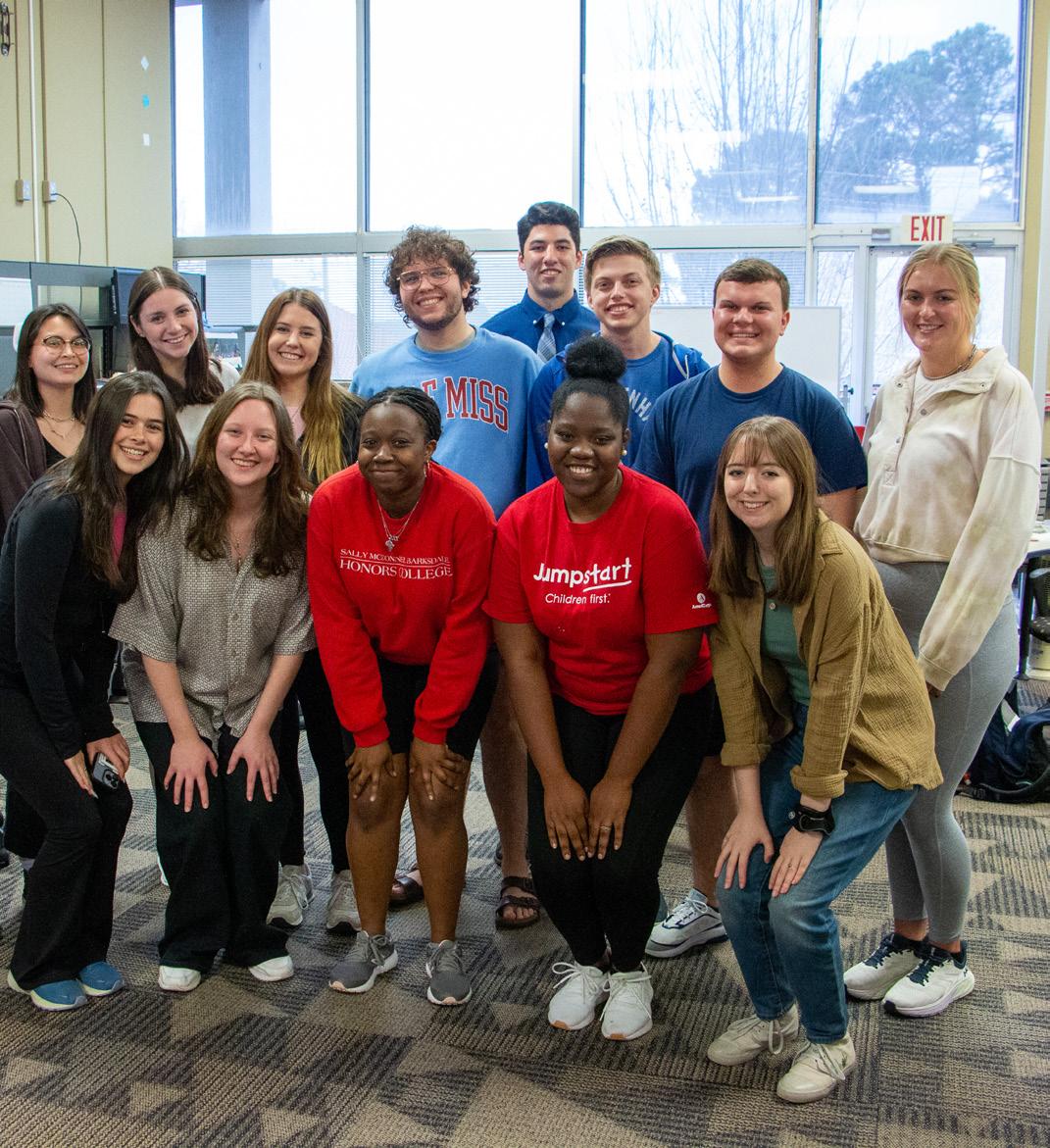

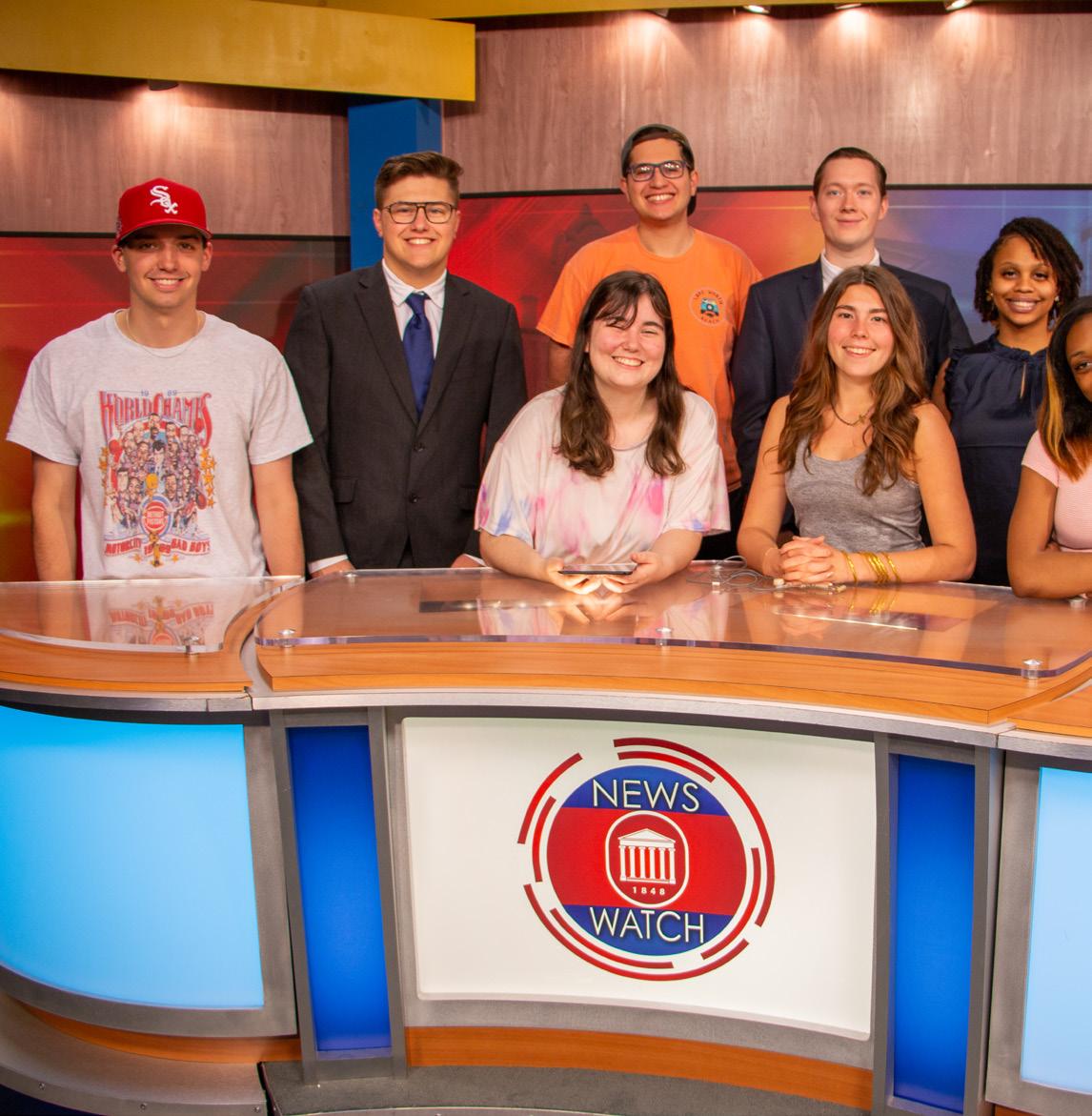

Increased Calorie Burn
Detoxification
Lower Blood Pressure
Anti-Aging & Skin Rejuvenation
Improved Circulation
Weight Loss





